|
|

Monticello Book Burning
1982
Banned Books Week
Celebrating the Freedom to Read
September 27–October 4, 2008
Tracking the Leer of the Sensualist
Judging Obscenity in 1930s America
Banned Books Online
Viva Banned Book Week
Nicole Belle
_______________________
With All Eyes on the Bailout, House Passes Trillion-Dollar Defense Bill
Joshua Holland
The House passed the Brobdingnagian spending measure 11 months after George W. Bush vetoed a bill -- one passed with a lot of bipartisan support -- that would have added $7 billion measly dollars per year to the State Children's Health Insurance Program, covering 4 million more uninsured children. You'd be hard-pressed to find a clearer sign of national psychosis.
_______________________
Bush, economic crisis, and war
Helena Cobban
We should be clear that the gargantuan amounts of money the country has poured into waging the two wars in Afghanistan and Iraq have been a big motor for the current crisis.
These defense expenses are, of course, ones that recur annually... So each year it's like the equivalent of passing an entire Wall Street bailout plan.
these wars have been financed purely through borrowing. Hence the national debt, which was on its way to being erased at the end of the Clinton presidency, is now headed up toward $10 trillion. You better believe that these two war-linked phenomena of the government being badly indebted (including to a number of foreign creditors) and the US public having been encouraged to go out and spend, spend, spend have both contributed mightily to the current financial crisis....(more)
_______________________
Whenever you hear the word "bi-partisan," even during the waning hours of the Bush years, it usually means something very bad is about to happen.
- Joseph A. Palermo
_______________________
 Matt Harnett
Killer Shots
A Photographic Response toWar
Catherine Edelman Gallery
_______________________
To the Person Sitting in Darkness
Mark Twain
1901
Extending the Blessings of Civilization to our Brother who Sits in Darkness has been a good trade and has paid well, on the whole; and there is money in it yet, if carefully worked -- but not enough, in my judgement, to make any considerable risk advisable. The People that Sit in Darkness are getting to be too scarce -- too scarce and too shy. And such darkness as is now left is really of but an indifferent quality, and not dark enough for the game. The most of those People that Sit in Darkness have been furnished with more light than was good for them or profitable for us. We have been injudicious.(....)
In the right kind of a light, and at a proper distance, with the goods a little out of focus, they furnish this desirable exhibit to the Gentlemen who Sit in Darkness:
Love, Law And Order,
Justice, Liberty,
Gentleness, Equality,
Christianity, Honorable Dealing,
Protection To The Weak, Mercy,
Temperance, Education,
– and so on.
There. Is it good? Sir, it is pie. It will bring into camp any idiot that sits in darkness anywhere. But not if we adulterate it. It is proper to be emphatic upon that point. This brand is strictly for Export – apparently. Apparently. Privately and confidentially, it is nothing of the kind. Privately and confidentially, it is merely an outside cover, gay and pretty and attractive, displaying the special patterns of our Civilization which we reserve for Home Consumption, while inside the bale is the Actual Thing that the Customer Sitting in Darkness buys with his blood and tears and land and liberty. That Actual Thing is, indeed, Civilization, but it is only for Export. Is there a difference between the two brands? In some of the details, yes. (....)
Having now laid all the historical facts before the Person Sitting in Darkness, we should bring him to again, and explain them to him. We should say to him:
"They look doubtful, but in reality they are not. There have been lies; yes, but they were told in a good cause. We have been treacherous; but that was only in order that real good might come out of apparent evil. True, we have crushed a deceived and confiding people; we have turned against the weak and the friendless who trusted us; we have stamped out a just and intelligent and well-ordered republic; we have stabbed an ally in the back and slapped the face of a guest; we have bought a Shadow from an enemy that hadn't it to sell; we have robbed a trusting friend of his land and his liberty; we have invited our clean young men to shoulder a discredited musket and do bandit's work under a flag which bandits have been accustomed to fear, not to follow; we have debauched America's honor and blackened her face before the world; but each detail was for the best. We know this. The Head of every State and Sovereignty in Christendom and ninety per cent. of every legislative body in Christendom, including our Congress and our fifty State Legislatures, are members not only of the church, but also of the Blessings-of-Civilization Trust. This world-girdling accumulation of trained morals, high principles, and justice, cannot do an unright thing, an unfair thing, an ungenerous thing, an unclean thing. It knows what it is about. Give yourself no uneasiness; it is all right."
Now then, that will convince the Person. You will see. It will restore the Business. Also, it will elect the Master of the Game to the vacant place in the Trinity of our national gods; and there on their high thrones the Three will sit, age after age, in the people's sight, each bearing the Emblem of his service: Washington, the Sword of the Liberator; Lincoln, the Slave's Broken Chains; the Master, the Chains Repaired.
It will give the Business a splendid new start. You will see. ...(more)
_______________________
The Rush to Judgment
Binary Thinking in a Digital Age
Peter Lurie
ctheory
 Our genetic and computer codes may be Manichean, but our thinking must not be. Dualism, which originated as a theory about the structure of the world, has calcified into an analytical set piece. We must find another model. We must bring a multivalent tool to bear on political, sociological, philosophical or economic issues. It would be rigorously open-minded, continuously recalibrated. It would cast dichotomies as guideposts rather than fenced-in camps. It would be vibrantly relational, a cross-pollinating perspective yielding imaginative solutions rather than deadening, zero-sum compromises.(...) Our genetic and computer codes may be Manichean, but our thinking must not be. Dualism, which originated as a theory about the structure of the world, has calcified into an analytical set piece. We must find another model. We must bring a multivalent tool to bear on political, sociological, philosophical or economic issues. It would be rigorously open-minded, continuously recalibrated. It would cast dichotomies as guideposts rather than fenced-in camps. It would be vibrantly relational, a cross-pollinating perspective yielding imaginative solutions rather than deadening, zero-sum compromises.(...)
The need for a more imaginative mindset is pressing, even urgent. There is no life at the poles, or at least not much of it. The action is south of the Arctic and north of the Southern Ocean. We live there; we must think there as well. Just as the beauty of black & white photography lies less in pure blacks and perfect whites than in the 11-tone gray scale, we must learn to think across a continuum. The power of an Ansel Adams print is less in the intrinsic majesty of Half Dome, which is photographed thousands of times each day, than in Adams' mastery of the zone system, a rigorously calibrated method of controlling exposure, development and printing to maximize range and density. The zone system is famously difficult. Adams used it to locate as many as 25 gray tones, but most photographers have happily abandoned the zone system in favor of the tinkering pleasures of Photoshop. As citizens, however, we don't have that luxury. We must think broadly on an open plane. That will require courage and, like the great basketball player, a sense of where we are. We don't think that way, but we should.......(more)
_______________________
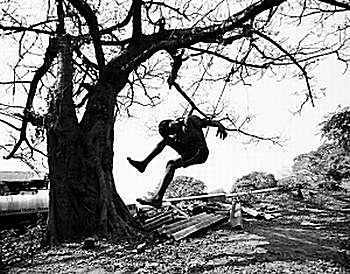 extraordinary children
Howrah Railway Station
Kolkata, India
Platform 22
Nathan Golden
Vewd
documentary photography magazine
_______________________
Bush Wants To Bankrupt America: There is Method To His Madness
Sam Hamod
The plan is very simple, but not obvious on first blush. Make sure that all the money is gone from the U.S. treasury, make sure the deficits are so great that all social and educational programs are cut, increase the military and security budgets to "protect our nation" with all these monies going to corporations and security firms who are extra-national (not tied to any country, but actually more than multi-national in that they are outside the purview of any nation at any single moment) and stave in the social security fund by allowing it to go to private corporations for "investment"-and you have the perfect scenario for saying, "only the private sector can save us-we're broke and they have the money to run every program, fund every program, but of course, at huge costs and profits for the private corporations." Our only resource will be the corporate lenders, especially the large extra-national corporations who will have loyalty to no one except their corporate coffers and large share owners throughout the world.
This plan is so obvious at this point that it is hard to believe because it is happening so fast and the Democrats and even conservative non- neo-con Republicans don't realize what Bush and his neo-con buddies are up to....(more)
_______________________
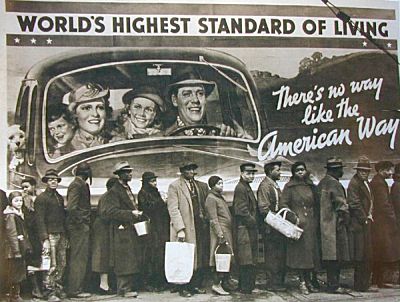
Margaret Bourke-White
1 2 3 4 America in the 1930s
_______________________
(Notes on) Politics, Theory & Photography celebrates its 3rd birthday.
Congratualtions and many thanks Jim. _______________________
Ten Books That Turned Me on to Poetry
K. Silem Mohammad
September 06, 2003
_______________________
You who are not kept anxiously awake for love's sake, sleep on.
In restless search for that river, we hurry along;
you whose heart such anxiety has not disturbed, sleep on.
Love's place is out beyond the many separate sects;
since you love choosing and excluding, sleep on.
Love's dawn cup is our sunrise, his dusk our supper;
you whose longing is for sweets and whose passion
is for supper, sleep on.
In search of the philosopher's stone, we are melting like copper;
you whose philosopher's stone is cushion and pillow, sleep on.
I have abandoned hope for my brain and head; you who wish for
a clear head and fresh brain, sleep on.
I have torn speech like a tattered robe and let words go;
you who are still dressed in your clothes, sleep on.
Rumi
(September 30, 1207-December 17, 1273 CE)
Translated by Jack Marshall
Rumi - Poems in Translation
_______________________
Close the Language-Door
Rumi
version by Coleman Barks
There is some kiss we want
with our whole lives,
the touch of Spirit on the body.
Seawater begs the pearl
to break its shell.
And the lily, how passionately
it needs some wild Darling!
At night, I open the window
and ask the moon to come
and press its face against mine.
Breathe into me.
Close the language-door,
and open the love-window
The moon won't use the door,
only the window.
_______________________
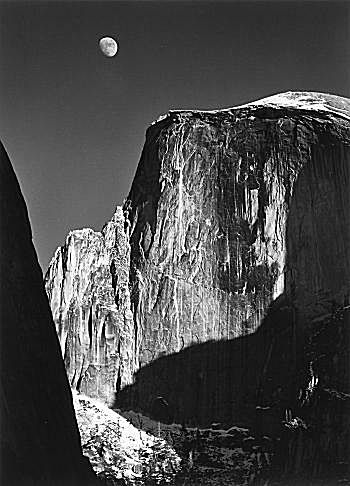
Moon and Half Dome
Ansel Adams
_______________________
Knowing I Live in a Dark Age
Milton Acorn
Knowing I live in a dark age before history,
I watch my wallet and
am less struck by gunfights in the avenues
than by the newsie with his dirty pink chapped face
calling a shabby poet back for his change.
The crows mobbing the blinking, sun-stupid owl;
wolves eating a hamstrung calf hind end first
keeping their meat alive and fresh...these
are marks of foresight, beginnings of wit;
but Jesus wearing thorns and sunstroke
beating his life and death into words
to break the rods and blunt the axes of Rome:
this and like things followed.
Knowing that in this advertising rainbow
I live like a trapeze artist with a headache,
my poems are no aspirins...they show
pale bayonets of grass waving thin on dunes;
the paralytic and his lyric secrets;
my friend Al, union builder and cynic,
hesitating to believe his own delicate poems
lest he believe in something better than himself:
and history, which is yet to begin,
will exceed this, exalt this
as a poem erases and rewrites its poet.

Waiting for Sunrise
Roman Loranc
1 2
Interview with Roman Loranc dreaming in daylight
Roman Loranc
Photographs 1993~2008
_______________________
Tragic Sense Of Life
Miguel De Unamuno
translated by J.E. Crawford Flitch
The man we have to do with is the man of flesh and bone—I, you, reader of mine, the other man yonder, all of us who walk solidly on the earth.
And this concrete man, this man of flesh and bone, is at once the subject and the supreme object of all philosophy, whether certain self-styled philosophers like it or not.
In most of the histories of philosophy that I know, philosophic systems are presented to us as if growing out of one another spontaneously, and their authors, the philosophers, appear only as mere pretexts. The inner biography of the philosophers, of the men who philosophized, occupies a secondary place. And yet it is precisely this inner biography that explains for us most things.
It behoves us to say, before all, that philosophy lies closer to poetry than to science. All philosophic systems which have been constructed as a supreme concord of the final results of the individual sciences have in every age possessed much less consistency and life than those which expressed the integral spiritual yearning of their authors....(more)
.....................................................
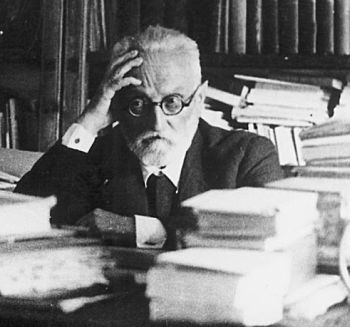
Miguel de Unamuno
b. September 29, 1864
Consciousness is a disease.
- Miguel de Unamuno
.....................................................
It is Night, in My Study
Miguel de Unamuno
Translated by Lillian Jean Stafford and William Stafford
It is night, in my study.
The deepest solitude; I hear the steady
shudder in my breast
--for it feels all alone,
and blanched by my mind--
and I hear my blood
with even murmur
fill up the silence.
You might say the thin stream
falls in the waterclock and fills the bottom.
Here, in the night, all alone, this is my study;
the books don't speak;
my oil lamp
bathes these pages in a light of peace,
light of a chapel.
The books don't speak;
of the poets, the meditators, the learned,
the spirits drowse;
and it is as if around me circled
cautious death.
I turn at times to see if it waits,
I search the dark,
I try to discern among the shadows
its thin shadow,
I think of heart failure,
think about my strong age; since my fortieth year
two more have passed.
Toward a looming temptation
here, in the solitude, the silence turns me--
the silence and the shadows.
And I tell myself: "Perhaps when soon
they come to tell me
that supper awaits,
they will discover a body here
pallid and cold
--the thing that I was, this one who waits--
just like those books quiet and rigid,
the blood already stopped,
jelling in the veins,
the chest silent
under the gentle light of the soothing oil,
a funeral lamp.
I tremble to end these lines
that they do not seem
an unusual testament,
but rather a mysterious message
from the shade beyond,
lines dictated by the anxiety
of eternal life.
I finished them and yet I live on.
_______________________
Buzzflash Interview With The Palin Churches Research Team
Bruce Wilson
_______________________
A Heartbeat Away, or Why Palin's Churches Matter
Bruce Wilson
...not because people at Palin's churches speak in tongues or for any specific gestural or behavioral expression. These things are deeply felt and not properly mocked or stigmatized, Rather, Palin's churches matter because pastors in those churches espouse an aggressive form of Christian nationalism and also the doctrine that all forms of religious and philosophical beliefs other than their own are invalid and even under demonic influence. (....)
Palin's churches are demon-haunted churches which tend to view the Catholic Church (especially) as well as all Protestant denominations as invalid and as manifestations of a "religious spirit" that's held to be demonic. Things devolve from there - the Third Wave stigmatizes much of Protestant and Catholic Christianity but it vilifies and literally demonizes Hinduism, Buddhism, Islam and all non-Christian religions and belief systems as manifestations of "witchcraft", to be driven from the Earth by "spiritual warfare" and by a physical, end-time, purifying last-generation army....(more)
_______________________
The Witch Fighter Anoints Palin
Max Blumenthal
_______________________
The devil in America
Laura Miller reviews Judge Sewall's Apology: The Salem Witch Trials and the Forming of an American Conscience by Richard Francis
salon sept 24, 2005
Francis argues that Sewall's apology -- made in a Boston church five years after the trials -- is extraordinary in more ways than one. The judge's statement was a sign, he maintains, of a major transformation in the way the Puritan colonists understood themselves and their world. According to Francis, it was out of Salem's nightmare of religious paranoia that American secularism was born. (....)
As crazy as the witch trials look from here, a lot of this thinking is still with us, from the outer fringes of wackiness, where Harry Potter books are denounced for seducing children into sorcery, to the more common belief that Americans have lost touch with the virtues of our forefathers. An obsession with conspiracies, the belief that an "alternate community" observing different sacraments constitutes a direct attack on the Christian mainstream, a conviction that the United States is God's chosen nation, even a preference for subtlety-impaired leaders who tout primitive notions of pure good and evil -- all these are still present as aspects of our political culture.(....)
The marvel of Sewall's career is not that a pious Puritan should ease into slightly more modern attitudes in his later years. Rather, it is the power of communal pressures and religious mania to make a constitutionally decent man complicit in the bloody persecution of his own neighbors. Furthermore, only someone who lives in England (Francis teaches at a British University) could take such a sanguine view of the triumph of secularism in the U.S. and a tempering of the American impulse toward religious absolutism and excessive moral self-confidence.
...(more)
_______________________
What Cheney did as part of the war on terror, Palin may well do for the culture wars.
The Sexual Politics of Sarah Palin
The Great Fear
David Rosen
Palin exemplifies what conservative analysts call “red-state feminism”. She represents a generation of conservative white women who share some of the same qualities of modern feminists. They are self-assured, often have college degrees, careers and are married with children. However, in distinction to modern “blue-state” feminists, many of these “red-state” feminists believe in “traditional” (and often fundamentalist religious) values. These values are directed to preserving the myth of the patriarchal family.
Sex is the most threatening issue challenging red-state feminists. The contradiction between their real-world accomplishments and self-hood, including erotic desire, and their accommodation to the fiction of the patriarchal husband remains unresolved. It is this lack of resolution that characterizes Sarah Palin and her quest for the Oval Office.
Capitol Hill sources are telling me that senior McCain people are more than concerned about Palin. The campaign has held a mock debate and a mock press conference; both are being described as “disastrous.” One senior McCain aide was quoted as saying, “What are we going to do?” The McCain people want to move this first debate to some later, undetermined date, possibly never. People on the inside are saying the Alaska Governor is “clueless.”
- Ed Schultz
_______________________
No one hates saying that more than I do. Like so many women, I’ve been pulling for Palin, wishing her the best, hoping she will perform brilliantly. I’ve also noticed that I watch her interviews with the held breath of an anxious parent, my finger poised over the mute button in case it gets too painful. Unfortunately, it often does. My cringe reflex is exhausted.(....)
If BS were currency, Palin could bail out Wall Street herself.
If Palin were a man, we’d all be guffawing, just as we do every time Joe Biden tickles the back of his throat with his toes. But because she’s a woman — and the first ever on a Republican presidential ticket — we are reluctant to say what is painfully true.
What to do?
Only Palin can save McCain, her party, and the country she loves. She can bow out for personal reasons, perhaps because she wants to spend more time with her newborn. No one would criticize a mother who puts her family first.
Do it for your country.
- Kathleen Parker, National Review
_______________________

encroachment
Roman Loranc
_______________________
The first function of any presidential debate is to demonstrate to the Big Money that both candidates are “safe”, first on the matter of keeping the rich secure from worry. The second function is to assure all relevant lobbies that they are ready and willing to blow up the world if American “security” requires it.
In the requisite demonstrations Obama and McCain sang in unison. They are as one with Wall St. They are ready to blow up the planet. Three times Obama said he completely agreed with the elderly madman opposite him. The interactions became progressively more hackneyed and absurd. Obama pledged to “take out” Osama bin Laden. McCain vowed to prevent another Holocaust of the Jews. Obama respectfully agreed with McCain that Putin is a potential problem and that plucky Georgia needs America’s succor. It was nauseating. Most of the world and its problems didn’t feature at all. Latin America? Free trade?
Between the two of them, the candidates affirmed, often in identical terms, almost every lunatic policy position that has doomed George Bush’s presidency and made America an object of derision and loathing among the nations. - Alexander Cockburn
_______________________
‘The Corporation’ Released for Free on BitTorrent
Filmmaker Mark Achbar just released an updated “official” torrent of it. Everyone is free to download, watch, discuss, and share it.
The new torrent download includes a high-quality rip of the master DVD and a 40 minute interview with Joel Bakan, the author of the book and writer of the film. Mark Achbar actually dedicated a computer in his garage to do nothing but seed.
Although the torrent download is free, the filmmakers encourage people to donate a small fee if they like what they see.(....)
The makers of “The Corporation just launched a Campaign for Corporate Harm Reduction (C4CHR) in collaboration with Hellocoolworld.com. The purpose of this campaign is to collect stories about the impact of the film, asking people what they did, or something they’ve heard happened as a result of the film.
“We want to create a feedback loop on the “what you can do” front, and perhaps turn it into a book. The torrent is a great way to stay in touch with people about our current activities Achbar” Achbar explained.
He added, “my only regret is that I didn’t put up my own torrent sooner.” thanks to Thivai Abhor_______________________
Comparing Crises: The 1930s, the 1970s, and Today
Ingo Schmidt
The Bullet - Socialist Project
_______________________
Passionately Credulous Bigots for McCain Launch Attack Ad
Gen. JC Christian, Patriot
_______________________
Meanwhile .....................
North of the border, Stephen Harper progresses toward election day, inside a protective bubble that keeps out the general public, protestors and media who want to talk to his candidates while he is on the set. And so far a metaphorical bubble has protected him from having to deal with the fact that south of the border, his ideology is going up in flames.
- James Laxer
.....................................................
The Harper Record
"38 chapters on every aspect of the Conservatives' record, from their handling of manufacturing closures, conduct of the Afghan mission, biofuels, tarsands, nuclear energy, migrant workers, disability rights, child care, and so on."
full text or individual chapters Canadian Centre for Policy Alternatives
via This Magazine .....................................................
Conservatives create “winning conditions” for shock therapy to come
Bruce Campbell
Harper’s hand is more likely to be off, than on, the economic wheel. And ironically, as the illusion of the self-regulating market is abruptly replaced by the visible hand of American corporate socialism emerging from the rubble of the Wall Street meltdown, Harper’s approach seems oddly out of touch with today’s reality. .....................................................
It is interesting timing that the financial heart of neo-conservatism is being ripped out right in the middle to two election campaigns. This is cause for hope.
- Alice Klein
.....................................................
Harper's Plan to Make You Fear Minority Governments
Scripting the carnival.
He gummed up Parliament for a reason.
David Sachs .....................................................
Harper's passive, fearful Canada
Carol Goar
Risks, threats and dangers dominate Stephen Harper's campaign rhetoric. His Canada is a country whose citizens worry about teenage killers; oil-hungry foreigners prowling their Arctic waters; terrorists lurking in their cities; and economic shock waves rolling toward them.(....)
Harper fails to see Canadians as a people who pull together in hard times. He is oblivious to the work millions of public-spirited citizens are doing in their communities to solve problems and create opportunities.
This is reflected in his approach to everything from crime to economic policy.(....)
It is a shame none of the other national party leaders has succeeded in tapping into the nation's better instincts.
It is a double shame Canadians are allowing Harper to set the bar so low....(more)
_______________________
Who Killed Canada?
video based on Mel Hurtig's bestselling book "The Truth About Canada" for free online.
via vive le canada
_______________________
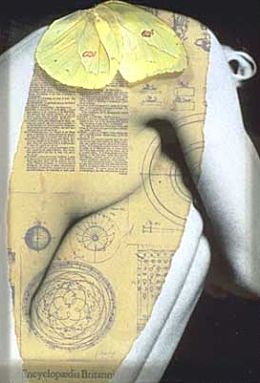
Encyclopedia
Mapping the Body
Mary Daniel Hobson
_______________________
How To?
Tiqqun
Everything through which ONE - my boyfriend, my family, my environment, my company, the state, the opinion – recognizes me is just that through which ONE takes me to be constrained.By constantly reminding me of what I am, of my qualities, ONE wants to extract me from each situation. ONE wants to extort from me, in every circumstance, a fidelity to myself which is but a fidelity to my predicates.I am expected to behave as a man, as an employee, as an unemployed, as a mother, as a militant, as a philosopher.ONE wants to contain within the bounds of an identity the unpredictable course of my becomings.ONE wants to convert me to the religion of a coherencethat was chosen for me.The more I am recognized, the more my gestures are hindered, internally hindered. Here I am, caught in the super-tight meshwork of the new power. In the impalpable net of the new police:THE IMPERIAL POLICE OF QUALITIES.There is a whole network of assemblages through which I "integrate" myself, and that incorporates these qualities in me.A whole petty system of filing, identification and mutual surveillance.A whole diffuse prescription of absence.A whole machinery of comporte/mental control, which aims at panopticism, at privatized transparency, at atomization.(....)
Rather than new critiques, it is new cartographiesthat we need.Not cartographies of Empire, but of the lines that flee out of it.How to do? We need maps. Not maps of what is off the map.But navigating maps. Maritime maps. Orientation tools. That do not try to explain or represent what lies inside of the different archipelagos of desertion, but indicate how to join them....(more)
_______________________
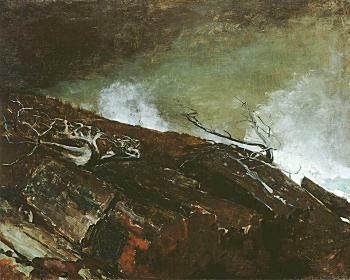 Coast of Maine
Winslow Homer
d. September 29, 1910
_______________________
If it is nothingness that awaits us, let us make an injustice of it; let us fight against destiny, even though without hope of victory.
-
Miguel de Unamuno
Miguel de Unamuno: The Contrary Self
Frances Wyers Google Books

photo - mw
_______________________
from
Say
George Szirtes
.....
say that you know it takes a moment to destroy
a life, to snuff out the moon and the sea and the sand,
to become a distant speck like the dark buoy
bobbing on the tide, to be far from firm land,
a kind of human flotsam, or a space
between constellations, an invisible band
of sky, the weeping memory of a lost face
in another’s grief, the friend, the mother, the pet
left puzzled by your absence; say the trace
you leave behind fades in time as people forget
your precise dimensions and the exact
pitch of your voice, that the vast internet
of the imagination registers you as a fact
without context, swimming in the immense
indivisible particularity of a compact
universe beyond summoning, say that a sense
of loss can be anticipated and is so,
or has been, as a whispered confidence
from one part of your brain to another and you go
round knowing all this for ever, my darling,
as do I, as does the voice saying yes, I know
in the poem, would that be at all consoling?
Say it were so: say it to the moon and to the ear
listening on the phone, to the waves rolling
towards your feet in the darkness, to the fear
of falling and let it go, my dear, let the rain
fall, let waves lap, let the invisible appear.
...(more)
Making Sense
qarrtsiluni
September-October 2007
Editors: Katherine Abbott and Rob Mackenzie
qarrtsiluni
online literary magazine
an experiment in online literary and artistic collaboration. The title comes from an Iñupiaq word that means "sitting together in the darkness, waiting for something to burst."
via Cassandra Pages
_______________________
 barbaric tales
Alan Davie
Painter, poet, jazz musician and jeweller
b. September 28, 1920
_______________________
Children of This Age
We are the children of this age,
this age is political.
All your, his, our
day and night-time affairs
are political affairs.
Whether you like it or not
your genes have a political future
the colour of your skin is political
your eyes have a political dimension.
Whatever you say has its echo
whatever you keep quiet about
is political regardless.
Apolitical poems are political too
the moon in the sky does not look like the moon.
To be or not to be, that is the question.
What question, tell me, my darling?
The political question.
You need not even be a human being
to acquire political importance.
It is enough just to be oil
fodder or recyclable material
or a conference table, the shape of which
can be on an agenda for months.
All this time people have been dying
animals have been starving
houses have been burning
fields have been turning fallow
just as in far off distant
less political ages.
Dzieci epoki / Children of this Age: A Poem in Polish and English [PDF]
Wislawa Szymborska
translated by Susan Bassnett and Piotr Kuhiwczak
Translation, Transcreation
EnterTextVolume 2 number 2 summer 2003
_______________________
Printing, having found in the book a refuge in which to lead an autonomous existence, is pitilessly dragged out onto the street by advertisements and subjected to the brutal heteronomies of economic chaos. This is the hard schooling of its new form. If centuries ago it began gradually to lie down, passing from the upright inscription to the manuscript resting on sloping desks before finally taking to bed in the printed book, it now begins just as slowly to rise again from the ground. The newspaper is read more in the vertical than in the horizontal plane, while film and advertisement force the printed word entirely into the dictatorial perpendicular. And before a child of our time finds his way clear to opening a book, his eyes have been exposed to such a blizzard of changing, colourful, conflicting letters that the chances of his penetrating the archaic stillness of the book are slight.
- Walter Benjamin, One-Way Street
_______________________
 Displacement
[Weighing the Planets]
1983
Olivia Parker
1 2 3
_______________________
A “post-secular” society – what does that mean?
Jürgen Habermas
Reset - Dialogues on Civilizations
I have thus far taken the position of a sociological observer in trying to answer the question of why we can term secularized societies “post-secular”. In these societies, religion maintains a public influence and relevance, while the secularistic certainty that religion will disappear worldwide in the course of modernization is losing ground. If we henceforth adopt the perspective of participants, however, we face a quite different, namely normative question: How should we see ourselves as members of a post-secular society and what must we reciprocally expect from one another in order to ensure that in firmly entrenched nation states social relations remain civil despite the growth of a plurality of cultures and religious world views?(....)
“Tolerance” is of course not only a question of enacting and applying laws; it must be practiced in everyday life. Tolerance means that believers of one faith and another and non-believers must mutually concede one another the right to those convictions, practices and ways of living that they themselves reject. This concession must be supported by a shared basis of mutual recognition from which repugnant dissonances can be overcome. The required kind of recognition must not be confused with an appreciation of an alien culture and way of living, or of rejected convictions and practices. We need tolerance only vis-à-vis worldviews that we consider wrong and vis-à-vis habits that we do not like. Therefore, the basis of recognition is not the esteem for this or that property or achievement, but the awareness of the fact that the other one is a member of an inclusive community of citizens with equal rights, in which each is accountable to everybody else for her political contributions.
Now that is easier said than done. The equal inclusion of all citizens in civil society requires not only a political culture that preserves liberal attitudes from being confused with indifference. ...(more)
_______________________
Country Poems from China
Translated from the Chinese by Berlin Fang
words without borders
The contemporary poets here all come from countryside China, but have a range of professions. Some are still farmers. Some have become laborers or office workers in cities. Some have become successful managers in businesses. These poets share an attachment to nature, the land, and the people in their hometowns. They share nostalgia for the countryside they used to know before the turbulent changes of reform. They have deep sympathy for their kin and compatriots who live hard lives as farmers, or in cities as migrant workers. Yet each poet is unique as they experience the countryside that watches them grow up and leave, and each is unique in the encounter with the outside world. All return with a renewed understanding of, and reconciliation with, their home towns or villages. These poems portray the lives of Chinese farmers and the land that sustains, attracts, and buries them....(more)
_______________________
Behind the Lines: War Resistance Poetry on the American Homefront Since 1941
Philip Metres
reviewed by Edward Brunner
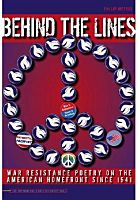 After a national catastrophe, Americans sometimes look to poetry for relief. Poetry is rediscovered and valued for the power of its rhetoric, as if the poet can function as a kind of speechwriter for the ages, lending an era the words it needs to understand itself. But in this view, the poem's value is not to instruct or guide but to comfort and assuage—to situate the present in all its disruption within a larger time frame, to make our current pain seem like a passing woe. Or as poet-critic Stephen Burt writes in a 2003 essay considering the post-9/11 popularity of W.H. Auden's "September 1, 1939": "We turn to poems most urgently, perhaps, just when we feel that our choice among courses of action (in public matters or elsewhere) is no choice at all, and that nothing we do in a world wholly outside ourselves can resolve the genuine conflict we face." This well-entrenched opinion that, when it comes to public matters, poetry can best function as consolatory, gently reminding us of our inability to solve immense dilemmas, is what Philip Metres sets out to oppose in his tightly focused case studies. After a national catastrophe, Americans sometimes look to poetry for relief. Poetry is rediscovered and valued for the power of its rhetoric, as if the poet can function as a kind of speechwriter for the ages, lending an era the words it needs to understand itself. But in this view, the poem's value is not to instruct or guide but to comfort and assuage—to situate the present in all its disruption within a larger time frame, to make our current pain seem like a passing woe. Or as poet-critic Stephen Burt writes in a 2003 essay considering the post-9/11 popularity of W.H. Auden's "September 1, 1939": "We turn to poems most urgently, perhaps, just when we feel that our choice among courses of action (in public matters or elsewhere) is no choice at all, and that nothing we do in a world wholly outside ourselves can resolve the genuine conflict we face." This well-entrenched opinion that, when it comes to public matters, poetry can best function as consolatory, gently reminding us of our inability to solve immense dilemmas, is what Philip Metres sets out to oppose in his tightly focused case studies.
To further such an oppositional project, Metres explains, poetry must be regarded "as both cultural product and cultural process," as he writes in a 2006 issue of the Iowa Journal of Cultural Studies. But the innovative turn that powers his research is his readiness to examine not just antiwar poetry but antiwar poetry of resistance. This is a poetry that speaks "from within a cultural matrix, while articulating some differential stance to that culture." And if it is sharply delineated, it nevertheless asks a large question: "how does the poet who resists war address both the nation at large (of which she is a part) and the resistance movement in particular (of which she is a part)?"
Metres's book-length study brings depth to those questions....(more)
Behind the Lines: War Resistance Poetry on the American Home Front since 1941
_______________________
The revenge of ideas: Karl Polanyi and Susan Strange
Fred Halliday
open democracy
Thoughout his life - and in Austria as much as in the US - Polanyi criticised the lack of realism of orthodox economics. The Great Transformation has been subjected to criticism from a number of directions, while more recently the tradition that its author represented has been pushed to one side by financiers and speculators (in the world of practice) and the majority of economists (in the academic world). In the process, a raft of ubiquitous supportive words and phrases have been generated to perpetuate the idea of the naturalness of the market - among them "market adjustments", "natural self-correction", "iron laws of trade and finance", "market forces" themselves.
But the greatest myth of all is that of the "free market" itself, as if the modern market was ever free in a meaningful way- of state guarantees, of security, international law, labour control and regulation; and as if a system in which power was allocated in a grotesquely unequal and unstable manner could be said to guarantee the "freedom" of most people subject to it. For Polanyi, the market - and the economy generally - was (in the words of one of his most important papers) - an "institute process"; a perspective that opens lines of inquiry that still reverberate across several disciplines. ...(more)
_______________________

textile mill
Almonte
photo - mw
_______________________
The Everyday
John Latta
33
Sharp green nut-rubble under
The hickory tree, seasonal work
Of squirrels methodically decimating it.
One chitters and sizzles, keeps
A tree between itself and
Me, scrabbling laterally if I
Approach. Leaves tinged with gold
Hint at a fire-lick’d
Plinth, upstart angels, draft plenipotentiary
Up to heaven, though nobody
Spouts that Ranter shit nowadays:
Upstart you mean startup, angel
You mean venture capitalist. One
Longs to cease belonging to
One’s foul century, where talk
Of nuts seems insupportable, the
Feckless denial of a genial
Nitwit “huff’d out of town”
By supercilious holders of deeds,
(Not words) howsoever worthless they
Be. Think of Keats who
Long’d to be “turn’d loose
To feed upon spiritual Mast”—
Denying the way the horrifics
Of the day demand something
Beyond scurrility and airy-plait'd
Nebulosities of the fancy, that
Total abandonment of one's trajectory
To the boot'd regulators, for
Whom one is expendable, a
Rote human machine, and not
"A sort of ethereal Pig"-
Or Kafka admitting bluntly "Writing
Is a stench."
...(more)

Large Bright Shop Window
1912
August Macke
d. September 26, 1914 91 images here
_______________________
 from from
The Poem of the End
Marina Tsvetayeva
b. Sept. 26, 1892 (old style)
2
And what have we come to?
tents of nomads
thunder and drawn swords over
our heads, some
terror we expect
listen houses
collapsing in the one
word: home.
It is the whine of a cossetted
child lost, it is the
noise a baby makes for
give and mine.
Brother in dissipation, cause
of this cold fever, you
hurry now to get home just
as men rush in leaving
like a horse jerking the
line rope down in the dust.
Is there even a building there?
Ten steps before us.
A house on the hill no higher a
house on the top of the hill and
a window under the roof is it
from the red sun alone
it is burning? or is it my life
which must begin again? how
simple poems are: it means I
must go out into the night
(and talk to
who shall I tell my sorrow
my horror greener than ice?
—You've been thinking too much.
A solemn answer: yes.
...(more)
Heritage of Marina Tsvetayeva
more 1 2
_______________________
"What, if anything, does this inflation in the use of the words
target and targeting tell us about the world in which we are living
and the direction in which it is going?"
Targets of Opportunity: On the Militarization of Thinking Samuel Weber
...a patchwork of readings and a series of unan- swered questions concerning the relation of ‘‘targeting’’ to thinking, political action, and self-definition. Although target- ing is generally approached with a certain suspicion in these readings, it is also clear that it is not something that can simply be ‘‘done away with,’’ a problem I discuss in more detail in regard to Freud’s staging of ‘‘The Man Moses’’ (Chapter 4). On the contrary, ‘‘targeting’’ seems inextricable from thinking, at least where its aim—its target?—is defined in cognitive terms, as it is in these essays. This is perhaps why, in the final chapter, it is in a reading of poetry—Benjamin’s reading of two poems by Ho¨ lderlin—that a possible alternative emerges to the kind of movement otherwise encountered in this book.
If one could sketch a figural trajectory of these essays, it would thus lead from the target, through the network, to a differ- ent kind of netting, and ultimately not to a figure in the carpet but rather to a figure of carpets, upon which footsteps leave traces. Whether such carpets and traces provide a thinkable al- ternative to the more lethal kind of targeting with which we are becoming increasingly familiar is a question that the readers of these essays are asked to confront.
download pdf _______________________
"Heidegger, Derrida, de Man, and countless others: It makes a difference whether those names serve as end points or as points of departure, or perhaps even as places where you catch your breath before setting forth again."
- Samuel Weber
Target of Opportunity: Networks, Netwar, and Narratives [PDF]
Samuel Weber
What blurring and blending have in common with swarming is the tendency to suspend, up to a point, the oppositional logic of mutual exclusivity and hence also of the clear-cut distinctions informed by it. Such “blurring” of distinctions can however go further and affect not just the individual components or nodes of a network but the network itself, rendering its enabling limits difficult if not impossible to determine. This can result in a certain indeterminacy about where a network begins and ends, spatially as well as temporally.16 And this indeterminacy can carry over and affect the conflicts in which the network engages. This is why “netwar,” unlike traditional war, requires no formal declaration to begin or to end and why such declarations today seem increasingly superfluous even on the part of nation-states, as with the recent war against Iraq. At the same time, what stands out against this background of indeterminacy is the one notion that netwar shares with traditional war: that of targeting. There is still an enemy, and however acephalous, or Janus-faced it might be, it must still be targeted—which is to say, located and subdued, either by being killed, destroyed, or rendered dysfunctional. As we shall see, the notion of targeting plays a significant role in discussions of netwar.
"Samuel Weber on Networks, Netwar, and Narratives"
Samuel Weber, Catherine Liu, Peter Krapp, Eduardo Cadava, Jean-Michel Rabaté
Slought Foundation
Religion, Repetition, Media
Samuel Weber
Samuel Weber: Acts of Reading
Simon Wortham
Google Books
_______________________

Texas Theater
Palestine, Texas 2006
Thirty-three Theatres
and a Funeral Home Alec Soth
_______________________
US election: Questioning the candidates
Nature
Barack Obama accepted Nature's invitation to answer 18 science-related questions in writing; John McCain's campaign declined. Obama's answers to many of the questions are printed here; answers to additional questions (on topics including biosecurity, the nuclear weapons laboratories and US participation in international projects) can be found at http://www.nature.com/uselection. Wherever possible, Nature has noted what McCain has said at other times on these topics.
US election: Questioning the candidates, part two
_______________________
Whenever a Great Bipartisan Consensus is announced, and a compliant media assures everyone that the wondrous actions of our wise leaders are being taken for our own good, you can know with absolute certainty that disaster is about to strike.
- Ron Paul
_______________________
America’s Elephant In The Room
David Michael Green
The second most astonishing thing about American politics is that John McCain and Sarah Palin have a respectable chance of winning the White House in 2008. (Or, for that matter, that any Republican could have a shot at any office for which the Democratic candidate hasn’t suddenly died on the stump.)(....)
The scope of the destruction is breathtaking to gaze upon. The rapidity with which American affluence and power and respect and responsibility were converted into their opposite numbers is mind-boggling. But the most astonishing thing of all is the absence of repudiation. Not from subscribers, of course. That army of clones was so existentially terrorized in their impressionable years by some toxic stew of religion, racism, sexism, homophobia, anti-Semitism, anti-communism and/or some other forms of anti-otherism – along with a sinking economic status – that their cold, stiff fingers will never be pried from the politics of guns, gays and god. Especially now, when they can also add to their fears the blame for being so spectacularly wrong about everything imaginable these last decades. Who would want to own that?...(more)
_______________________
McCain's Debate Ploy
Michael Tomasky
The commission on presidential debates stated shortly after Obama spoke that the debate will go on. If the commission says it and Obama says it, it will go on, I suspect. But we have yet to see which chess piece McCain moves next. Who can imagine that? Think of the most cynical thing you can think of, then double it.
Abraham Lincoln ran for re-election while leading the Union troops in the civil war. Franklin Roosevelt ran for re-election in the midst of terrible depression in 1936, a far worse economic crisis than we have right now, and in 1944 while prosecuting the second world war.
If John McCain can't debate while thinking about the country's economy, then he's even more ill-equipped to hold the job than I think he is. But of course he is capable of doing both. His proposal is not serious. It is just a rancidly political act. That he goes before cameras and tries to pass it off as nonpolitical, hoping that people will buy it, is what makes it contemptible....(more)
_______________________
Second Frozen Angel
Alice Notley
can you change the
grammary to
the humming beneath
what they
do so
in the shock blood
hear the notes
of this language
went to get the other children, he was shot in the
back of his head
can you change the grammar
if there is no word shot
I can change it
attack syria, if you change to
there is no word
attack
if in this language now there is no done to
help me undress and put on my wing
there’s blood everywhere
an exact rate
of sorrow
because you spoke
as an american from
america against
america
in the privilege
of gaining
fame where it counts
america.
...(more)
PoetryPolitic: A Blog in 50 Days
The Poetics of DisobedienceAlice Notley
_______________________

Landscape with Cows,
Sailing Boat and Figures
August Macke
1914
_______________________
Five Poems
John High
conjunctions
The two remained anonymous to wind
& eternal without bells the vacant
monastery on an edge of sea where
hermits gathered among caves & tall
grass surrounding potato fields the boy
yearning (this) to copy out words inside
handwoven sheets of books & pages
of stories some burnt others
without beginning or end a girl spying up
from a beach & searching the name
of a brother among the dead washing
her clothes still naked by mountain
river running down steps from monastery
walls humming as three monks & four
crows a scribe crossed by foot over
a wooden bridge swinging & calling down
to gulls bringing more manuscripts
in beaks as the woman finds her own
name printed (there) in an autobiography
beginning good morning worlds without end
...(more)
_______________________
 August Macke
_______________________
from
This Is Thinking
Alan Davies
Again. Writing is an aid to forgetting.
For those of us fastidious about words writing is
a way of getting some of them out of the head in
order to make way for new experiences.
Without writing we'd hold on to words at the
expense of those experiences which happily (at
times) give rise to them.
Writing is letting go.
To write is to let go.
Writing is a way of getting younger.
(It's a way of getting younger so that we can
age.
Gracefully.
Gracelessly.
Or otherwise.)
...(more)
_______________________
In the uncertain hour before the morning
Near the ending of interminable night
At the recurrent end of the unending
After the dark dove with the flickering tongue
Had passed below the horizon of his homing
While the dead leaves still rattled on like tin
Over the asphalt where no other sound was
Between three districts whence the smoke arose
I met one walking, loitering and hurried
As if blown towards me like the metal leaves
Before the urban dawn wind unresisting.
Little Gidding, Four Quartets
T.S. Eliot
September 26, 1888 - January 4, 1965
_______________________
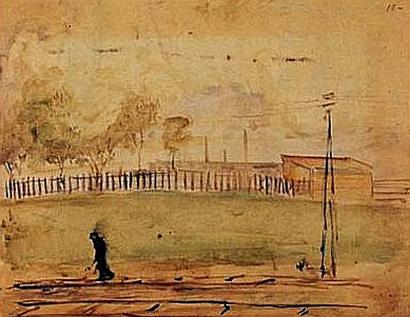 August Macke
_______________________
I decline to go on living
in the marketplace of wolves.
I won't howl,
among the sharks of the field.
I won't swim beneath
the waves of squirming backs.
I have no need of holes for hearing
or seeing eyes.
To your crazed world there's
only one answer: No!
Marina Ivanovna Tsvetaeva, From: Verses to Chekhia, l938
Translated by Daniela Gioseffi with Sophia Buzevska
drunken boat
_______________________
 photo - rjw
(a brother)
_______________________
And the trees about me,
Let them be dry and leafless; let the rocks
Groan with continual surges; and behind me,
Make all a desolation. Look, look, wenches!
Paint me a cavernous waste shore
Cast in the unstilled Cyclades,
Paint me the bold anfractuous rocks
Faced by the snarled and yelping seas.
Display me Aeolus above
Reviewing the insurgent gales
Which tangle Ariadne's hair
And swell with haste the perjured sails.
- T. S. Eliot, Sweeney Erect
 Carnival, Germany
Josef Breitenbach
(1896-1984)
Gitterman Gallery Exhibition more
Incredibly, even after a 40-year career teaching and exhibiting in America, the German-born emigre's pre-war work remained a secret, only uncovered after his death in New York in 1984. Among a cache of photographs found in his estate were portraits of James Joyce, Bertolt Brecht and Max Ernst - friends and acquaintances from Breitenbach's years of exile in Paris and a taster of the twilight world through which he moved. It was also revealed that he had exhibited alongside Man Ray in Paris and had catalogued in depth the world of pre-war German theatre.
- Barry Didcock
Sunday Herald, The, Feb 25, 2001
_______________________
Adriano Prosperi talks to Elisabetta Ambrosi
Translation by Francesca Simmons
If one also considers the past, could one say that the civilisations with the most vitality are those that integrated diversity? Or does a disintegration of identity undermine in some way these same civilisations? What is the “immunity” balance between welcoming and rejecting diversity?
Our societies seem to be blocked as far as their social set-ups are concerned, in which the gap between an extremely wealthy minority and an impoverished middle class increases frenetically, and these extremes share the same lack of solidarity as far as those less fortunate are concerned. These are culturally repetitive and not very creative societies, capable only of exploiting the legacy of the past’s historical and artistic creations, treated like stocks and shares; not to mention Italy where the landscape is destroyed as are natural resources, and great wealth consisting in research and universities is wasted. The winds of conservationism and fear blow in Europe. The phenomenon of hatred felt for the Romas is only the tip of a hidden and dangerous iceberg as far as this fear is concerned.
Is there another path to follow for the hoards we see entering the European area, differing from blind exploitation masked as a defence of “identity”? We shall see if there is an answer, and what that answer will be. One thing is clear. To address this problem one would need to see improved social institutions and individual guarantees to raise our current standards, such as schools, health services and protection of the territory. We desperately need policies looking to the future, investing in research, attacking corporations and providing solidity and hope for the younger generations, instead of obliging them to emigrate or experience flight, isolation, temporary and non-constructive jobs....(more)
Reset - Dialogues on Civilizations
_______________________
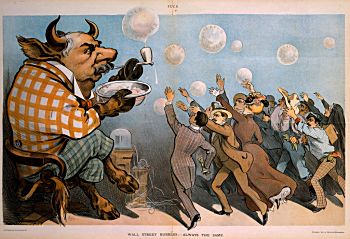
"Wall Street Bubbles - Always the Same"
J. Ottmann Lith. Co, 1901
pingnews
Flickr
_______________________
Oratory on the Death of Neoliberalism
Jasper Bernes
Rarely is class power in the US as nakedly visible as during this last week, and rarely is the two parties’ de jure acceptance of the dictatorial rule of capital so explicit, unless of course one finds the canned populism convincing or thinks that the wrangling in the legislature over the details of Paulson’s bill is anything less than theatre, designed to convince us of the iron necessity of the main piece, a massive socialization of risk that leaves profits privatized. Because, you know, it would be one thing if the Treasury’s plan to pump $700 billion of economic Viagra into Wall St., the better to keep on fucking you, was actually going to work. But why should anyone believe that? Credit will start to flow again if the plan goes through, but as many historiansand economists have pointed out, this isn’t just Wall Street’s crisis, it’s the result of thirty years of rising inequality in the US, of an economy built on nothing but household debt and longer and longer working hours. The plan will shore up stock prices, sure, but chances are the ensuing inflation and, therefore, the declining value of wages will still mean a nasty economic contraction. The stockholders get to keep their money but the rest of the country gets starved by inflation and unemployment. Sound like a deal? And, of course, if you ever believed any of Obama’s promises in the first place, this likely means that if he gets elected there’s not even a weak national health care plan and no investment in “green” energy.
It’s as if the majority of the country were just told they’ll have to work weekends for free for the rest of the year. Instead, it seems better that we either nationalize the banks completely and let the profits redound to the treasury or, for added viewing pleasure, let the banks burn and put the money into subsidizing consumer demand through social programs, job creation and debt relief. The bankers are the ones who believe in the free market, the necessity of shock therapy, the salutary effect of price as a disciplinary mechanism, so let them have it. Once they get a taste of that American freedom, they’ll surely thank us....(more)
_______________________

Herb Block
Political Cartoons from the Crash
to the Millennium
Library of Congress Exhibition via Plep - NY
_______________________
Never before in the history of American capitalism has so much been asked of so many for (at least in the first instance) so few.
- Robert Reich
_______________________
How Positive Thinking Wrecked the Economy
Barbara Ehrenreich
Greed – and its crafty sibling, speculation – are the designated culprits for the ongoing financial crisis, but another, much admired, habit of mind should get its share of the blame: the delusional optimism of mainstream, all-American, positive thinking. As promoted by Oprah, scores of megachurch pastors, and an endless flow of self-help bestsellers, the idea is to firmly belief that you will get what you want, not only because it will make you feel better to do so, but because thinking things, “visualizing” them – ardently and with concentration – actually makes them happen. You will be able to pay that adjustable rate mortgage or, at the other end of the transaction, turn thousands of bad mortgages into giga-profits, the reasoning goes, if only you truly believe that you can.(....)
According to a rare skeptic, a Washington-based crisis management consultant I interviewed on the eve of the credit meltdown in 2007, even the magical idea that you can have whatever you truly want has been “viral” in the business culture. All the tomes in airport bookstores’ business sections scream out against “negativity” and advise the reader to be at all times upbeat, optimistic and brimming with confidence—a message companies relentlessly reinforced by treating their white collar employees to manic motivational speakers and revival-like motivational events. The top guys, meanwhile, would go off to get pumped up in exotic locales with the likes of success guru Tony Robbins. Those who still failed to get with the program could be subjected to personal “coaching” or of course, shown to the door.
The same frothy wave of mandatory optimism swept through the once-sober finance industry....(more)
_______________________
"The Depressed Person" [PDF]
David Foster Wallace
Harper's, January, 1998
The depressed person was in terrible and unceasing emotional pain, and the impossibility of sharing or articulating this pain was itself a component of the pain and a contributing factor in its essential horror. Despairing, then, of describing the emotional pain itself, the depressed person hoped at least to be able to express something of its contextits shape and texture, as it were-by recounting circumstances related to its etiology.
"Brief Interviews With Hideous Men" [PDF] David Foster Wallace Harper's, October, 1998
Good People
David Foster Wallace
The New Yorker, February 5, 2007
_______________________

Annabella
Munich, c. 1935
Josef Breitenbach
_______________________
Jacques Derrida: The Perchance of a Coming of the Otherwoman
Carole Dely
Translation by Wilson Baldridge
eurozine
These few remarks I just made may already seem arbitrary, thetical or polemical, stamped with ideology, to the point of thinking in terms of a certain "war between the sexes" involving a feminist clan against another one called phallocratic, and so forth. Let us understand that speaking out on this subject, whether it be the fact of a man or a woman, can hardly remain innocent. It is inscribed within a history, within a long tradition. And as soon as it is posed, the subject seems already always polemical. For instance: what is the woman's place in philosophical thought? Within creative thought in general? In politics, in political and social thought?... And if she seldom appears in actual fact, what is the woman's share of responsibility in this regard, and what is or was that of men? But then who are "the men" and who are "the women", do these two categories really exist like two clans, two adverse clans? Wouldn't it be better still to take care to distinguish individuals, singular individualities and personalities, to speak instead of "certain women", "certain men"?
All these questions are difficult, complex. And the greatest difficulty is that one cannot completely escape these questions, however much one might wish to. For after all, perhaps "the question of women" is no more pertinent than would be "a question of men" (for instance with regard to the recognition of their individual freedom). Apart from socio-historical circumstances, by right if you will, why would woman be more of a question than man? One might think there is a great deal of prejudice tangled up with all this, in such a way that it has become difficult to untangle the true from the false, as the philosopher Descartes would say. And prejudice can always impede the search for more serious thought, or one free of too much passion. But here again, the debate could be endless: perhaps one ought to demonstrate what was just said, which could appear as a thesis, a matter to be defended, as one speaks of "the feminist cause" to be defended... while waiting for "the masculine cause" to become one as well, yes perhaps, why not... and so forth.
Questions surrounding woman, women, gender, or even sexual difference represent an obstacle at the heart of Derrida's deconstructive work. His writing opens up for the possibility of the reorientation of discourse, history, and the tradition itself....(more)
_______________________

Archaic Idol
Mark Rothko
September 25, 1903 - February 25, 1970
"It was with the utmost reluctance that I found the figure could not serve my purposes....But a time came when none of us could use the figure without mutilating it."
-
Mark Rothko
_______________________
McCain's Economic Plan For Nation: "Everyone Marry A Beer Heiress"
_______________________
The Great American Setup
Onward To A Hollow State
John Robb
The modern nation-state is in a secular decline, made inevitable by the rise of a global market system. Even developed nations, like the US, are not immune to this process. The decline is at first gradual and then accelerates until it reaches a final end-point: a hollow state. The hollow state has the trappings of a modern nation-state ("leaders", membership in international organizations, regulations, laws, and a bureaucracy) but it lacks any of the legitimacy, services, and control of its historical counter-part. It is merely a shell that has some influence over the spoils of the economy. The real power rests in the hands of corporations and criminal/guerrilla groups that vie with each other for control of sectors of wealth production. For the individual living within this state, life goes on, but it is debased in a myriad of ways.
The shift from a marginally functional nation-state in manageable decline to a hollow state often comes suddenly, through a financial crisis. This crisis typically has the following features:......(more)
_______________________

Max Ernst and Marie-Berthe Aurenche
Josef Breitenbach
1936
_______________________
Reflections on Our Inner Bush
Corporate Monkeys In Our National House Of Mirrors
Phil Rockstroh
September 21, 2006
...we cannot lay all the blame upon Bush. Our nation's aura of insularity and hysteria was present long before Bush. Bush is merely emblematic of the depth of our collective denial regarding how cheaply we have sold ourselves to the exploitive corporate order and the concomitant unease engendered by this Faustian bargain. (....)
Personally and collectively, our fate might well be determined by how honest we're willing to be with ourselves. After all, by way of our passivity, we?re at least partially responsible for letting a million Rovian Turd Blossoms bloom. We have summoned Bush by the incantation of our hidden intentions; perhaps, if we were to awaken to the George W. Bush concealed within, we might understand our own collaboration in creating him -- and then, at long last, we can begin the process of dismissing him and all he represents....(more)
_______________________

VE Day
Josef Breitenbach
_______________________
Thanatos Athànatos
Salvatore Quasimodo
translated by Wayne Chambliss
drunken boat
And must I now recant,
God of tumors, God of the living flower,
and begin again with a no
to the dark stone “I am,”
consent to death and inscribe
on every tomb our only certainty: Thanatos Athànatos?
Lacking a name to describe
the dreams, the tears, the fury
of a man defeated by questions unanswered?
Our dialogue changes;
becomes, quite possibly, absurd.
There--beyond the mist,
within the trees, the potency of the leaves--
true is the river that clings to its banks.
Life is not a dream.
True is Man and his invidious plan of silence.
God of silence, open the solitude.
 Les phases de la lune III
Paul Delvaux
b. Sept. 23, 1897
_______________________
Maritime
Reginald Shepherd
(1963-2008)
There’s always been this dream that reason has, shearing off
from the conceivable like pollen or Sahara dust: a windy day
along Lake Michigan, cold water, cold war won. The ferroconcrete
lakefront where yuppies jog with dogs and clouds of midges
hover mating is a second nature, like the city it defines
by exclusion. People sun themselves on yellow
terry cloth across cement, water too clear
to be clean. The mind, unable to rest in such fragments
capital has shored up or left behind (man-made rock
fissured to exposed steel rods, absence filled in with lichen
and a sudden fear of heights:......(more)
PoetryPolitic: A Blog in 50 Days
Daily political poetry news-from September 15th through November 4th, 2008-brought you by the citizens at Wave Books
_______________________
A Note on Poetry and Politics
Reginald Shepherd
October 1, 2007
Those who wish to change society might better turn their energies toward society itself, to the real areas of oppression and suffering, economic, political, racial, and sexual. (Identity politics can be a useful organizing tool of social activism, though it can also lend itself to a group solipsism that blinds people to structural, systemic issues.) To blame literature, or culture as a whole, for social, economic, and political woes (or even to see it as central to their perpetuation) is evasive at best, dishonest at worst, a kind of posing as politics, in social commentator Adolph Reed’s trenchant phrase. But such posturing is much easier than doing the hard work of trying to change the world. “Cultural activism” is a poor substitute for real political activity, although we live in an era in which cultural matters are up for debate while fundamental economic and political questions are not, except on the often loud but frequently incoherent and usually ignored fringes.
George Oppen gave up writing poetry for several years in favor of political activism, because he believed neither that poetry could change society nor that it should be subordinated to an agenda. In Oppen’s words, “If you decide to do something politically, you do something with political efficacy. And if you write poetry, you write poetry, not something you hope, or deceive yourself into believing, can save people who are suffering.” Several years ago, I was asked by someone I had just met whether my poetry was Afrocentric. I told him that I didn’t know what he meant by that term, and he said, “You know, dedicated to the liberation of black people everywhere.” My only answer was, “I don’t think that poems can do that.”
Poetry’s preservation of mystery is its preservation of a space not colonized by capitalism’s totalizing impulse. This is also the preservation of a space not colonized by instrumental reason....(more)
_______________________
"Strange women lying in ponds,
distributing swords,
is no basis for a system of government"

Michael Palin for President
youtube
_______________________
Palin's spiritual colleagues describe themselves as part of "the final generation," engaged in "spiritual warfare" to purge the earth of "demonic strongholds." Palin has spent her entire adult life immersed in this apocalyptic hysteria. Ask yourself: Is it a good idea to place the most powerful military on earth at her disposal? Do we actually want our leaders thinking about the fulfillment of Biblical prophecy when it comes time to say to the Iranians, or to the North Koreans, or to the Pakistanis, or to the Russians or to the Chinese: "All options remain on the table"?
Yes, I Can: Refusing to hesitate isn't a primordial truth of wise governance
Sam Harris
I believe Governor Palin's speech was the most effective political communication I have ever witnessed. Here, finally, was a performer who—being maternal, wounded, righteous and sexy—could stride past the frontal cortex of every American and plant a three-inch heel directly on that limbic circuit that ceaselessly intones "God and country." If anyone could make Christian theocracy smell like apple pie, Sarah Palin could.(....)
I was relieved to discover, as many were, that Palin's luster can be much diminished by the absence of a teleprompter. Still, the problem she poses to our political process is now much bigger than she is. Her fans seem inclined to forgive her any indiscretion short of cannibalism.(....)
Palin may be a perfectly wonderful person, a loving mother and a great American success story—but she is a beauty queen/sports reporter who stumbled into small-town politics, and who is now on the verge of stumbling into, or upon, world history.
The problem, as far as our political process is concerned, is that half the electorate revels in Palin's lack of intellectual qualifications.(....)
We have endured eight years of an administration that seemed touched by religious ideology. Bush's claim to Bob Woodward that he consulted a "higher Father" before going to war in Iraq got many of us sitting upright, before our attention wandered again to less ethereal signs of his incompetence. For all my concern about Bush's religious beliefs, and about his merely average grasp of terrestrial reality, I have never once thought that he was an over-the-brink, Rapture-ready extremist. Palin seems as though she might be the real McCoy. With the McCain team leading her around like a pet pony between now and Election Day, she can be expected to conceal her religious extremism until it is too late to do anything about it. Her supporters know that while she cannot afford to "talk the talk" between now and Nov. 4, if elected, she can be trusted to "walk the walk" until the Day of Judgment.
thanks to Shaun Mullen
_______________________

Heaven and the red boat
Carl-Henning Pedersen
(23 September 1913–20 February 2007) 1 2 3
_______________________
Witch Hunter that Prayed Palin into Office is Coming Back to Wasilla!
mudflats
Our governor believes in the power of a guy who believes that demons live in pythons, and witches cause traffic accidents. She believes that a Kenyan witch-hunter prayed her into office. Ladies and Gentlemen, behold the Republican candidate for Vice President of the United States of America, and tell me what that says about the Presidential candidate who nominated her.
_______________________
Palin's Apocalyptic Nightmare?:
The End Times and Christian Right Dominionism
Chip Berlet
Talk To Action
Reclaiming Citizenship, History, and Faith
thanks to Jay Taber atFourth World Eye
_______________________
The Politics of Tribulation
Sarah Palin and the Rapture
Raymond J. Lawrence
_______________________
The Dominatrix Politics of Drilling and Killing
Sarah Palin: Venus in Furs
Dr. Susan Block
...a difference that’s thicker than lipstick: I'm for the separation of Church and State, and the Governor is running as a Messenger from God. And that’s no vague conceptual God. That’s not the Jewish God, nor the Muslim, Buddhist nor Hindu God, and it’s certainly not the Goddess. Sarah Palin’s God is The Christian God with a capital crusading C, and she is His Messenger. And if you don’t accept Jesus as your Savior and the Republican party as your overlords, get out of the way of her snowmobilee. This is Sarah’s world and you’re just running from her bullets in it.(....)
I’m all about Peace through Pleasure. Sarah’s for Drilling and Killing. How can such a saintly woman be so brutal? Easy. See, candidates like me, who aren’t absolutely postive that God is on our side, or even that He or She exists, feel the need to be diplomatic, to work for the good of society, and the planet. People that speak with God directly, like Governor Sarah and Mad King Lameduck George, don’t sweat such small stuff, what with God Himself IM’ing them to rain bombs on civilians, plunge the economy into ruin and pillage the planet. Praise the Lord...(more)
_______________________
Palin Can Launch Us Back in Time
US Army Brigadier General (retired) Janis L. Karpinski
I know enough about Palin's character to assess her as ill-equipped, clueless and unprepared to take control of our nation in the event of McCain's early demise or incapacitation, much less qualified to serve as the commander in chief of all military forces. Unfortunately for Palin, leadership is not derived by a process of osmosis. She does not automatically qualify for commander in chief or get to check the "Military Service" block because she has a son in the Alaska National Guard who is deployed to Iraq, or because she dons a camouflage uniform and knows how to shoot straight.
I spent more than 28 years in and around the military, mostly as a member of the Army Officer Corps. I saw what women think they must do in order to fit in with their male counterparts and feel a part of the male bastion of control. Sarah Palin is cut from the same mold as these women who were desperate to fit in with male colleagues - desperately trying to prove herself as tough as, or tougher than, "the boys" who are competing with her. Palin sets the stage with stories of her prowess in murdering wolves, moose and caribou from a helicopter platform vantage point, begging the question, "C'mon boys, don't you think I am tough enough?"...(more)
_______________________

Resistance
or The Black Idol
František Kupka
(September 23, 1871 - June 24, 1957)
_______________________
New world order
Robert Peston
It's a world in which the Chinese state, if it co-ordinated the investments of its cash-rich institutions, could end up owning more-or-less the entire financial system of the US and the UK.
via bertramonline
_______________________
Let the free market carry out their corpses to the gutter. And mine too, perhaps, for as a magazine writer I depend on the thoughtlessness and blind-mole cupidity of credit-card consumerism – the credit system now imploding – to feed the ad-market that feeds the magazines that pay my bills. Without dumb blondes buying Manohlo Blahniks and metrosexuals fawning over prawns in overpriced restaurants, my paycheck turns to dust.
But the fact is that our economic system is a lunatic and suicidal system, and it deserves to go down.
- Christopher Ketcham
Bush Brings WMD Line to Wall StreetDean Baker
_______________________
 night train
Paul Delvaux
_______________________
Art and Research
a journal of ideas, contexts and methods
Volume 2. No. 1.
With and Around Jacques Rancière
Jacques Rancière and The (Re)Distribution of the Sensible:
Five Lessons in Artistic Research
Ross Birrell
Behind Police Lines: Art Visible and Invisible
Stephen Wright
Jacques Rancière: Aesthetics is Politics
Sophie Berrebi
An Exchange with Jacques Rancière
via Philosophy's Other: Theory On The Web
_______________________
Remembering Edward Said Five Years On
Steve Lendman
Said said it all, and ended one opinion piece as follows: "Jonathan Swift, thou shouldst be living at this hour." But even he might have blanched in disbelief considering the current state and potential horror of its consequences. Said understood. He's sorely missed when we need him most....(more)
_______________________
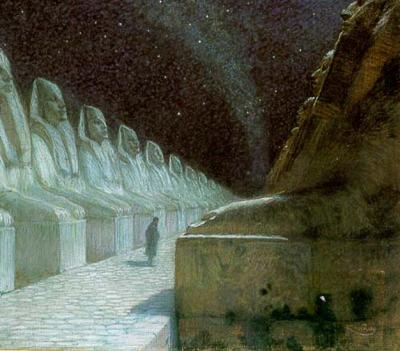 the way of silence
František Kupka 185 images
Ciudad de la Pintura
_______________________
The B Side of Paradise:
The Ten Best Jazz Records for Driving
Chris Fujiwara
hermenaut
Someone once asked me to make a jazz tape to listen to in the car. At that time my experience in cars was mainly as a passenger, so in making the tape I chose music that I thought would be fun to listen to while someone else was driving. I had little direct intuition of how music can promote or block the astute semiconsciousness ideally conducive to driving. I didn't know then what I know now: that music and driving are linked as totally, as fatally, as driving and money. If I give up something of myself, of my individuality, in the banality of driving, I must get something back from the heightened loss of self provided by music. Music completes in terms of pleasure the ecstatic flattening of the driver into invisibility and microtemporality by allowing the flattening to be experienced as an inflation.
With these considerations in mind, herewith I present the ten best jazz records for driving, in reverse order of roadworthiness...(more)
_______________________
An Interview with Lisa Samuels on Laura Riding and Poetry (Part 3)
Waggish
What contemporary poets do you see as working within the verbal and philosophical tradition that Riding deeply ploughed?
LR: In the UK, Alan Halsey (he's more overtly literary-historical about it), J H Prynne, Marianne Morris (she's more cheerful about it), Keston Sutherland, and in the U.S. Leslie Scalapino, Stacy Doris, Barrett Watten, and Justin Katko come to mind, and from Canada Lisa Robertson, from Germany Ulf Stolterfoht (whom I read in translation). Not that there aren't many other interesting writers, but I'm trying to think of poets who interrogate the word, and syntax, and power, and the acculturated body in relation to those....(more)
_______________________
Peter Culley gets a page at the Electronic Poetry Centre which has a Canadian Portal

Maurice Blanchot
22 September 1907 - 20 February 2003
from
The Last Man
Maurice Blanchot
Translated by Lydia Davis
/ubu editions
As you know, there is someone inside this cell. I would rather not talk about it. I believe it is an image. Against you, motionless thought, everything that is reflected in us of everyone comes to assume form, shine, and then disappear. In this way we have the most people, in this way everyone is reflected in each of us by an infinite glimmering that projects us into a radiant intimacy from which each returns to himself, illuminated by being no more than a reflection of everyone else. And the thought that each of us is only the reflection of the universal reflection, this answer to our lightness, makes us drunk with that lightness, makes us ever lighter, lighter than ourselves, in the infinitely glimmering sphere which, from its surface to its single spark, is our own eternal coming and going.
Why do we think that? Because we think everything, every thought is ours, and even the heaviest, once it touches us, quickly becomes light enough to rise and take us with it.
Propped against you, thought against which I rest, my forehead on which my forehead lies heavy, impassable gravity that yields sometimes, nevertheless, to give me a feeling of the past, very cold space in which sterile space returns to space. Why must I keep you, you who keep me? It is a great concern. To live this way in everything so far from everything, and to sustain lightness as a weight, to address words to you that don’t reach you, don’t express me—and to hold you fast so that you remain strictly delimited, a little chamber where someone has to live.
An excerpt from "Joubert and Space"
in The Book to Come by Maurice Blanchot translated by Charlotte Mandell
The stars please Joubert, but more than the stars, which often sparkle too brilliantly, it is great shining space, the diffuse light that is slowly revealed in it, and there reveals that easy simultaneity of distinct perfections, synthesis of the vague with the precise. In a note from his early adulthood, we see him trying to compose a cosmology rather close to that of Cyrano de Bergerac and the ancient authors, in which the stars are only holes in the sky, voids by which the enigma of a hidden light is collected and poured: space hollows, space no longer condensed, but subtracted and diminished to the point of rupture, where it is made into clarity.These metaphorical contemplations that send us back to nocturnal space as if to a great text of silences, and to the book as if to an immobile sky of stars in movement, may seem within reach of everyone, but, for Joubert, they open up as the demanding expression of what he must accomplish. An ambitious model, but one that does not crush this modest genius, for what is written on high guarantees him that he can represent it by means of art, if it is true that, withdrawn from ourselves, we can find in ourselves the same intimacy of space and light into which we must henceforth put all our cares so that our life will correspond to it, our thinking preserve it, and our works make it visible. "...And all my stars in one sky.... All space is my canvas. II. It falls to me from the stars of the mind." ...(more)
The Demand of Writing Maurice Blanchot pdf
The Blanchot Reader
edited by Michael Holland
pdf
The Space of Literature
Maurice Blanchot
translated by Ann Smock
pdf .....................................................
Spurious' collected posts on Blanchot
Two essays on Blanchot
Charlotte Mandell
A Language of Absence
Charlotte MandellThere is no such thing as a passive reader of Blanchot. Reading Blanchot becomes an active engagement; he involves the reader in his thinking; he makes the reader think, and respond, and question. Pick up any book of Blanchot, start reading anywhere, and before you're even aware of it, you have become involved: he has engaged you in a conversation; something in you resists, but you read on; suddenly you discover the patience of true reading, the infinite patience required to tease out a subject, play with it, negate it, reassert it, leave it unresolved. Blanchot had infinite patience, and infinite generosity too. He welcomes all of literature, all of it, he lets the words come and he follows them faithfully, so faithfully. Blanchot believed in the power of the word, in the power of language to lead us where it likes, where we may not have thought of going. There is a wonderful selflessness in Blanchot, an emptying-out of self and an investment in language, a faith in the unfailing ability of language to lead us out of ourselves, out of our own nonexistent ego into -- what? Something other, something beyond. ...(more)
Blanchot, The Obscure Edited by Rhonda Khatab, Carlo Salzani, Sabina Sestigiani and Dimitris Vardoulakis colloquy
The Movement of Testimony:
Suffering and Speech in Blanchot and Antelme
Lars Iyer
The Unbearable Trauma and Witnessing in Blanchot and Levinas [PDF]
Lars Iyer
janus head
Our Responsibility: Blanchot’s Communism [PDF]
Lars Iyer
Contretemps
Blanchot, Narration, and the Event
Lars Iyer
Blanchot's Vigilance:
Literature, Phenomenology and the Ethical
Lars Iyer
amazon
Blanchot's Communism:
Art, Philosophy and the Political
Lars Iyer
amazon _______________________
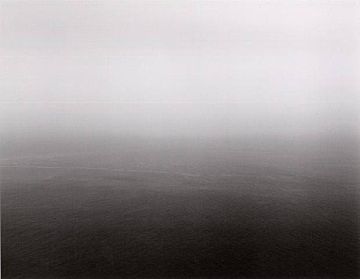
Seascape
from Time Exposed
Hiroshi Sugimoto more
_______________________
II. “A” Silence
There are no noisy tourists in Derrida’s pyramid.
...the silent writing of its a...
...the inaudible but displaced character of this literal permutation...
...this silent spelling mistake...
...it is written or read, but is not heard...
...by a silent mark, by a tacit monument, or, one might say, by a pyramid...
...silent, secret, and discreet, like a tomb...
...It is a tomb that cannot even be made to resonate...
...this pyramidal silence...
...this silence that functions only within what is called phonetic writing...
...and it is itself silent...
...is inaudible. The inaudible opens the two present phonemes to hearing...
...the silent token I must give...
...this unheard-of thought, this silent tracing...
...a task whose statement has remained nearly inaudible...
...in being sounded it dies away, like the writing of the a, inscribing its pyramid in differance...
The silent a of differance, a grapheme without a phoneme, or writing without
the presence of speech to authorize it, shares a space, to be sure, with a certain invisibility
The Noise of the World [PDF]
Michael Filimowicz
Abstract
This essay traverses a heterogeneous terrain, finding important links in the ideas of Jacques Derrida and John Cage, and relating these to diverse cultural topics such as film soundtrack design, audio art, Saussurian linguistics, the sound and light shows at the Egyptian pyramids, the analogic nature of digital information, and cybernetics. Furthermore, the essay attempts to create some bridges- through the concept of “perceptual differance”- between the divergent world pictures (to use Heidegger’s term) of cognitive psychology (with its quantitative frame of analysis) and the more slippery domain of hermeneutics.
Janus Head Journal of Interdisciplinary Studies in Literature, Continental Philosophy, Phenomenological Psychology, and the Arts _______________________

"Marina Dubai"
day/night double exposures
Thomas Weinberger
_______________________
Difference
Amrita Bharati
[Translation from Hindi by Aruna Sitesh and Arlene Zide]
He, just a huge mountain of lies
He talked for hours
about gunpowder
so when I handed him a match
he backed up
like an unbroken mule.
Running through the mustard fields, that mountain
turned into
first, a camel
then, a jackal
then, just an empty thought.
10 Hindi Poems
Exquisite Corpse
_______________________

courtesy of Gen. JC Christian, Patriot
Jesus' General
The Bailout:
The Bond Billionaires Piggybacking The American Taxpayer For Another Gilded Ride
Raymond J. Learsy
Wall Street Is Licking Its Chops at the Bush Team's Multi-Hundred Billion Dollar Giveaway Plan
William Greider
0 To $1 Trillion In 4 days Flat
Atrios
It's fascinating to watch how easily consensus is manufactured. A few days ago elite opinion seemed to be cheering Paulson's "no bailout" line, and now they're cheering a trillion bucks thrown down the crapper. All the Very Serious People will spend their days coming up with their pony plans, oblivious to the fact that the pony plan is not an option. The Bush administration's plan is the option. We've seen this game played before....(more)
We all live in Pottersville NowLloyd Alter
Every Day a Little Death:
The Five Stages of Democratic Grief
Ellis Weiner
_______________________

Tucson
Ron Jude
_______________________
In a Dark Time ... The Eye Begins to See
Seven Years Old
Congratulations Loren and thanks for sharing through all the permutations.
_______________________
Host
a long piece on political talk radio by David Foster Wallace
Atlantic, April 2005
Whatever the social effects of talk radio or the partisan agendas of certain hosts, it is a fallacy that political talk radio is motivated by ideology. It is not. Political talk radio is a business, and it is motivated by revenue. The conservatism that dominates today's AM airwaves does so because it generates high Arbitron ratings, high ad rates, and maximum profits. ...(more)
_______________________
Formality and occasionality in the poems of Mark Young
Nicholas Manning
jacket
OuLiPo against O’Hara? Ion against Socrates? Our tekhnai against our Muse? In short, the conflict seems to have a history. I mention this dichotomy however between form and occasion in the specific context of this important collection from a vital contemporary New Zealand poet, not because the dual exploration of these conflicting terms seems to me rare–though it does–but because what Mark Young accomplishes with this dual assertion of form and occasion seems to me so intriguing.
My reason, then, for talking of this division at the beginning of this review, is that Young’s poems are apt to make us feel that it is possible to attain a poetic event-horizon–a glittering if often imaginary crossroads–where form and occasion seem almost one and the same. Where there is no necessary division between immediate Romantic gestation and sluggish Classical shaping. Where the value of the initial moment–a poem’s experiential ‘beginning’–may come to be justified by the complexity and value of the subsequent procedures which come to bear on its genesis....(more)
.....................................................
Nicholas Manning edits The Continental Review
Mark Young edits Otoliths and publishes Otolith Books. You can access a great deal of his own work here as well as a fine interview with Tom Beckett
_______________________
Spins
John Mowitt
pmc
"Books that teach how to dance--
There are writers, who, by presenting the impossible as possible and speaking of morality and genius as if both were merely a mood, a caprice, produce a feeling of high-spirited freedom, as if one were to get up on tip-toe and simply had to dance for joy."
---
Nietzsche, "From the Souls of Artists and Writers"
Testing
Leaping right in I offer the following as a way to find one's footing in what follows. Despite the epigraph from Human all too Human, this is not a study of Nietzsche. Nietzsche comes up, but the text is not about him. For that matter Elias, Marx, Kierkegaard, de Man, Plato, and Derrida all come up, but the text is not about them. It is about dance and philosophical reflection as they are taken up by these figures. What recommends these figures is that they thematize different but related aspects of the matter at hand, and they do so with different degrees of intensity. In Marx dancing appears, as it were, in passing. In Nietzsche it returns eternally. Both, however, are concerned with the limits and force of philosophical reflection, a concern that achieves a distinctly reflexive urgency in the fashionable latecomers, Derrida and de Man. This said, what follows has no ambition to be either a philosophy of dance or a history of the relation between philosophers and dancers. Instead, this is a text that seeks primarily to raise questions about dance by detailing how dance is staged within philosophical reflection. In effect, it pushes off from the hardly controversial hunch that there is more to dance than we might otherwise think, and that this "more" becomes accessible when tracing, however erratically, the way philosophical reflection (of the sort embodied in Nietzsche's remarks above) puts dance to work....(more)
_______________________

André Kertész:
On Reading
_______________________
After Great Pain
Emily Dickinson
After great pain, a formal feeling comes--
The Nerves sit ceremonious, like Tombs--
The stiff Heart questions was it He, that bore,
And Yesterday, or Centuries before?
The Feet, mechanical, go round--
Of Ground, or Air, or Ought--
A Wooden way
Regardless grown,
A Quartz contentment, like a stone--
This is the Hour of Lead--
Remembered, if outlived,
As Freezing persons, recollect the Snow--
First--Chill--then Stupor--then the letting go--

the ghosts of presents past
infinite thØught
_______________________
If the writer is, as Maurice Blanchot declares, a daytime insomniac, then the reader is his sleeper sunk in the other's impossible dreams.
But what of the boundary separating one from the other? If we recognise a space between writer and reader, between the sovereign self and the unavowable community of booklovers, between mastery and oblivion, does it exist in a purely metaphorical realm, an unlit border crossing with inattentive guards perhaps or a no man's land littered with corpses and literary critics? Or could it be that the space is before us, for real, hidden in plain sight?
- Stephen Mitchelmore reviewing Night Work by Thomas Glavinic
_______________________
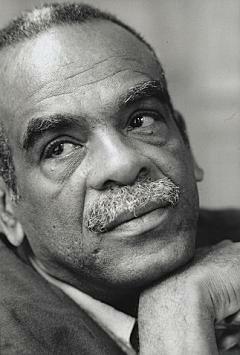
Photo: J Sassier
Edouard Glissant @ 80
Pierre Joris offers selections from his translation of Introduction to a Poetics of the Diverse
I speak and, before all, I write in the presence of all the world's languages. Many languages are dying today throughout the world — in Black Africa for example, languages are disappearing as their users are absorbed into a larger national community, or because the language is no longer a language of peasant production or, simply, of production and thus becomes eroded, or simply because its users disappear physically from the country where they lived — but we know that we write in the presence of all the world's languages, even if we know none of them. To take my own example, I am permeated, poetically permeated with that necessity even as I have incredible difficulty speaking any other language than those I use (Creole and French). But to write in the presence of all the world's languages does not mean to know all the world's languages. It means that in the present context of multiple literatures and of the relation of poetics with the chaos-world, I can no longer write in a monolingual manner. That is to say that I deturn and force my language not into syntheses but toward linguistic openings which permit me to conceive of the relations between today's languages on the surface of the earth — relations of domination, connivence, absorption, oppression, erosion, tangency, etc. — as the fact of an immense drama, an immense tragedy from which my own language cannot be exempt and safe. And therefore I cannot write monolinguistically in my language; I write it in the presence of this tragedy, of this drama. One cannot save one language in the world by letting the others die....(more)
.....................................................
Edouard Glissant
By J. Michael Dash
(Cambridge Studies in African and Caribbean Literature)
google books
.....................................................
Just as the first uprooting was not marked by any defiance, in the same way the prescience and actual experience of Relation have nothing to do with vanity. Peoples who have been to the abyss do not brag of being chosen. They do not believe they are giving birth to any modern force. They live Relation and clear the way for it, to the extent that the oblivion of the abyss comes to them and that, consequently, their memory intensifies.
For though this experience made you, original victim floating toward the sea’s abysses, an exception, it became something shared and made us, the descendants, one people among others. Peoples do not live on exception. Relation is not made up of things that are foreign but of shared knowledge. This experience of the abyss can now be said to be the best element of exchange. from a longer selection by Thivai Abhor from Glissant's Poetics of Relation, translated by Betsy Wing
_______________________
Scaffolding
Steve Himmer
Dark Sky Magazine
... first time since the fall. He poured himself a glass of water, gulped it down, and poured a second and third. In time his heart slowed, his blood pressure relaxed, and he came back to himself. Most nights he would have turned on the news but tonight he was afraid of what the reporters would tell him, the city’s top story, maybe national news, and he didn’t want to know any more details than those he already did: it had happened, and it was his fault. Buildings don’t fall from the sky by themselves.
So instead of the news he watched the History Channel, a show about Winchester Cathedral and a diver named William Walker who swam beneath it in one of those heavy old diving suits, shoring up footings and repairing the cathedral’s foundation even though it was dangerous and no one had dived in the marsh beneath a building before....(more)
Steve maintains a presence at tawny grammar
_______________________
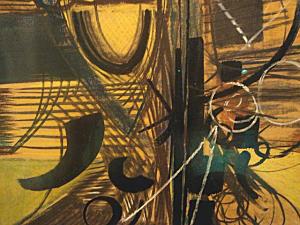
Hans Hartung
21 September 1904 - 8 December 1989
_______________________
The reason why I do not spend my days in despair and my nights in hopeless weeping simply is that I am in love with my own ruin. I therefore deserve no sympathy, and probably shan’t get it: my own profound self-compassion is enough. I am so abominably self-conscious that no smallest detail in this tragedy eludes me. Day after day I sit in the theatre of my own life and watch the drama of my own history proceeding to its close.(...)
Sometimes, as I lean over a five-barred gate or gaze stupidly into the fire, I garner a bitter-sweet contentment in making ideal reconstructions of my life, selecting my parents, the date and place of my birth, my gifts, my education, my mentors and what portions out of the infinity of knowledge shall gain a place within my mind - that sacred glebe-land to be zealously preserved and enthusiastically cultivated. Whereas, my mind is now a wilderness in which all kinds of useless growths have found an ineradicable foothold.
-
W. N. P. Barbellion, December 20, 1916
The Complete Works of W. N. P. Barbellion
courtesy of Ray Davis
_______________________

Leonard Cohen
b. Sep 21, 1934
photo from Harp Magazine
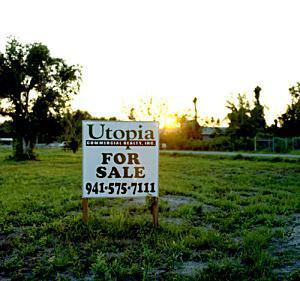
Meryl Truett at Barbara Archer Gallery
via
_______________________
Opening up the health insurance market to more vigorous nationwide competition, as we have done over the last decade in banking, would provide more choices of innovative products less burdened by the worst excesses of state-based regulation.
- McCain on banking and health
_______________________
There is no telling how many Americans have been wiped out, or close to it, this week. As bad as it is for younger people, they have two or three decades to recoup. Old people, like Mildred, retirees who rely on small investment portfolios to supplement Social Security and the man who wrote me two weeks ago, do not.
But don’t expect any help. There is bail-out money – borrowed from China – but only for banks, along with golden parachutes for their executives who created this train wreck. The rest of us are on our own.
-
Ronni Bennett, Elders and the Wall Street Mess
.....................................................
I do not ever want to hear another damned word about the free market. I don’t want to hear another thing about letting the market regulate itself. I don’t want to hear about the free flow of capital. I don’t want to hear about government getting out of our lives.
None of it. From superfunds to super-bailouts, I am tired of other people getting rich being irresponsible and then being told I have to pay to clean it up. I didn’t read one punitive aspect of this new plan. Not one punishment for the people who did this.
- John Cole
_______________________

Kurtzweil
Jörg Wickram
(~1505-1562)
Kurtzweil Satires
bibliodyssey
_______________________
The New Age
Stevie Smith
Shall I tell you the signs of a New Age coming?
It is a sound of drubbing and sobbing
Of people crying, We are old, we are old
And the sun is going down and becoming cold
Oh sinful and sad and the last of our kind
If we turn to God now do you think He will mind?
Then they fall on their knees and begin to whine
That the state of Art itself presages decline
As if Art has anything or ever had
To do with civilization whether good or bad.
Art is wild as a cat and quite separate from civilization
But that is another matter that is not now under consideration.
Oh these people are fools with their sighing and sinning
Why should Man be at an end? he is hardly beginning.
This New Age will slip in under cover of their cries
And be upon them before they have opened their eyes.
Well, say geological time is a one-foot rule
Then Man's only been here about half an inch to play the fool
Or be wise if he likes, as he has often been
Oh heavens how these crying people spoil the beautiful geological scene.

Stevie Smith
Sept 20, 1902 – March 7, 1971 Stevie Smith - Poems and Biography Collected Poems
Stevie Smith
google books
Stevie Smith -Audio Interviews
BBC Four
Stevie Smith: Girl, Interrupted
Jessica Walsh
Papers on Language and Literature, Winter 2004
Among the edgy, innovative, and fashionable young poets drawing crowds at popular 1960s poetry festivals was a unique attraction: Stevie Smith, over sixty years old, atonally singing her poetry while wearing clothing suggestive of a schoolgirl's uniform, complete with white stockings. Occasionally, between poems, she chattered in a form of baby talk (Sternlicht, "Introduction" 11). Her sartorial and linguistic imitation of youth suggests a current of obsessive remembering, a single-minded thirst for an imagined youth that is at once dissonant and enthralling. Although she may have startled her audiences with such displays, both her wardrobe and her chatter were entirely consistent with her poetry, for in her verse she displays the same unsettling nostalgia. Those familiar with the basic story of Smith's childhood-a saga of illness, abandonment, confinement, and death-might wonder why she invariably returns to the child-like. But the very fact of repeated injury led Smith to imagine incessantly what she did not have. Enacting a poetic spin on Freud's recently born "talking cure" in order to address a number of mental illnesses she carried with her, including obsessive neurosis and severe bouts of depression, Smith repeatedly writes through her childhood, especially in the early works A Good Time Was Had by All (1937) and Tender Only to One (1938). A pioneer in her own history, Smith adapts and sometimes abandons traditional forms in order to explore new territory. Infused with the sorrow of loss, she employs the sing-song rhythms of nursery rhymes and the haphazard violence of fairy tales to tackle the difficulties of an unwelcome adulthood. Using elusive and varied poetic voices, her poetry obsesses about an idyllic childhood even as it mourns the absence of it....(more)
.....................................................
How Far Can You Press A Poet?
David Orr
The Believer
Philip Larkin said that Smith’s poetry “speaks with the authority of sadness,” but what it more frequently speaks with is the license of despair. And Smith’s despair isn’t the wild despair of grief or defeat, but the hushed despair of drudgery and isolation, of a quicksilver mind ground down again and again in repetitions that stack up like unfinished chores: “We all do wrong… There I go again… As I said… and had a cat named Flo… Bring my thoughts to an end… Bring my thoughts to an end…” Smith matches her plate-juggling absurdity—her “wobble”—against this pressure, and absurdity loses out in the mechanical flatness of the final line, “Then you will be practically unconscious without absolutely having to go.” Recall Bryson’s description of Smith’s public reading: “It was as though what was being dramatized was a state of being so pent up, so much without outlet, that emotions couldn’t have, any longer, appropriate objects.” This is a fair sketch of idiosyncrasy run amuck, but it’s also a compelling portrait of mental and spiritual extremity. Though biographical details generally tell us much less about writers than we suppose, it’s worth noting that Smith entered secretarial school around the age of eighteen and spent much of her life in a clerical job that was dull at best, crushing at worst (“Dark was the day for Childe Rolandine the artist/ When she went to work as a secretary-typist”). It should come as no surprise that one of Smith’s most passionate admirers was the equally beleaguered, if differently situated, Sylvia Plath.
But where does this leave the question of Smith’s technique?...(more)
_______________________

A Forest
Giacometti
Louisiana Museum of Modern Art
Copenhagen
Traces in the Sand
flickr
_______________________
Avital Ronell Interview
by Alexander Laurence
You coined this word: Narcossism. Can you elaborate on this concept?
I wanted to suggest that narcissism has been recircuited through a relation to drugs. Narcossism is supposed to indicate the way that our relation to ourselves has now been structured, mediated, that is, by some form of addiction and urge. Which is to say, that to get off any drug, or anything which has been invested as an ideal object -- something that you want to incorporate as part of you -- precipitates a major narcissistic crisis. Basically I wanted to suggest that we need to study the way the self is pumped up or depleted by a chemical prosthesis.
It seems that addictions are the sine qua non of human ontology. It would be interesting to hear you describe a subject without addictions.
Since I link it to the death drive and beyond the pleasure principle, the Freudian readings of pleasure that are never pure, they aren't necessarily on the side of wholesomeness and health. I try to say how that's a myth and a mystification: the virginal pure body that would be non-addicted, absolutely outside of addiction. That's why I include bodybuilding, vitamins, technology. I think that the structure of addiction is fundamental. That isn't to say that it can't be negotiated, managed, or somehow brought into a rapport of its own liberating possibility. I want to suggest that there are no drug free zones. Now, it could be that there are good and bad addictions. I don't see how one can write, or be an artist, or think without some installation of the addictive structure....(more)
_______________________

Oysterhouse
Meryl Truett
_______________________
Beyond financial crises, beyond riots for food and the madness of King George, the prospect of losing our life-support system is the one truly existential test our society, arguably our species, will face in this quarter century. Any prime minister who does not at least prepare to meet it fails his moment in history.
The Business of Saving the EarthChris Wood walrus
None too soon, a group of dissenters has stood back from balance-sheet fundamentalism and adopted a new approach. They call it “ecological economics,” a phrase acknowledging that in terms of social, economic, biological, and environmental matters, we really are all in this together. Canada has been slower to act on this insight than some other countries. But even here the facts are becoming undeniable. Despite our vast landscape, it’s clear we have few fresh fields to plow or lakes to pump. Especially in our most populous regions, we must now learn to work with what we have — perhaps with less.
Plainly we have been counting the wrong things and putting our efforts in the wrong places. What, then, if we counted things differently? To see where that might lead, I travelled first to one of the most remote and superficially backward places on the continent: the Sierra Gorda in central Mexico....(more)
The Walrus Magazine

L'Atelier René Tazé
Erik Desmazières
_______________________
An Interview with Lisa Samuels on Laura Riding and Poetry (Part 1)
Waggish
Riding is such a singular figure that she is difficult to associate with any particular school of poetry. But would you compare her to the Objectivists like Zukofsky and Oppen?
LS: Laura Riding I wouldn't necessarily put with Zukofsky because her poetry is systematically more abstract and allegorizing than his, less explicit in its processing of particular urban identity, in spite of her being raised in NYC and situated principally in urban contexts until the move to Majorca in 1930. She does share some of Zukofsky’s sense of verbal energy, especially as we see in his early “A” segments.
But I would put her next to George Oppen – not least because they both ceased writing poetry, or at least participating in poetic production, for a very long period in the middle of their lives and of the 20th-century, but also because of a commonality in their investigations of imaginative experiencing, he more from a phenomenological and minimalist perspective, she more from a dramatic/role-playing and exuberant one....(more)
.....................................................
(Part 2)
Riding’s poetry reads to me as a far more open-ended questioning of language and meaning than her later critical writing, which can be didactically strict in its directed goal of redefining how language and meaning should work.
LS: In her poetry, Riding wants to redefine ‘how language and meaning should work’ but, because of the nature of language, she in fact (in my view) demonstrates a more open-ended ‘questioning of language and meaning’. Again, that’s in her poetry. In her early critical work and short stories (until 1939) I think she is more direct and directive about the lamentable limits of the human imagination in the face of what language is capable of – what it does do to us and what it can do to and for us. ...(more)
Lisa Samuels at the Electronic Poetry Center
_______________________
Four Poems
Tom Mandel
from
Temptation Roofing
Tom Mandel
Long have I lived with no diorama,
not gesturing to a painted wall,
no permanent sunset painted orange on my face,
no loved ones stacked in the verisimilitudinous corner of the cave
expanding in place with self-sameness and head-so-long flight.
Yet even in motion I heard every word you egged me on to speak
water rising above the clay, water entering the small room
of your silence and of my breaking it.
Was I not there when he set the angle of my hand
motionless for that moment and all since?
Is breath best taken in or released?
With a gesture of pained restraint, or a frowning circus smile?
Absent in the best sense, night has poured itself on our day
Loved, moonlike, turning light into our path
consuming what those few pointed to, motioning
across the platform to numbered tracks.
...(more)
mark(s) online quarterly
Tom Mandel at PennSound
including Talk on Spinoza: Philosophy and Poetry
Tom Mandel is a co-author of The Grand Piano: An Experiment in Collective Autobiography, San Francisco, 1975-1980
Interview with Tom Mandel by Sheila Murphy
e-x-c-h-a-n-g-e-v-a-l-u-e-s
_______________________
e-x-c-h-a-n-g-e-v-a-l-u-e-s, the book
edited by Tom Beckett
vols 1 2 3
Otoliths bookstore
_______________________
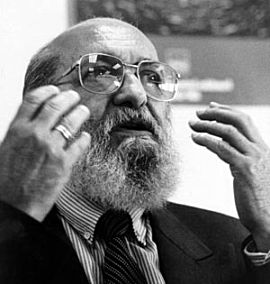
Paulo Freire
September 19, 1921 - May 2, 1997
image found here
The Loss of Paulo Freire
Rethinking Schools
His writings stand in sharp contrast to U.S. educational debates and practices too often tainted by contempt for the learning abilities of poor people, crude efforts to focus schooling on vocational tracking, and hierarchical methods of instruction that insult the intelligence and humanity of students. Pious declarations that schools should promote good citizenship hardly obscure the overwhelming emphasis placed on competition, personal advancement, and knee-jerk patriotism. In Freire's words and deeds we can find practical inspiration to counter such trends by exploring ways to make learning lively, democratic, subversive of privilege, and capable of merging the quests for personal and collective liberation. We can find tools to work toward, as he put it, "education as the practice of freedom." ...(more)
.....................................................
Pedagogy of the Oppressed
Paulo Freire
The central problem is this: How can the oppressed, as divided, unauthentic beings, participate in developing the pedagogy of their liberation? Only as they discover themselves to be “hosts” of the oppressor can they contribute to the midwifery of their liberating pedagogy. As long as they live in the duality in which to be is to be like, and to be like is to be like the oppressor, this contribution is impossible. The pedagogy of the oppressed is an instrument for their critical discovery that both they and their oppressors are manifestations of dehumanization.
Liberation is thus a childbirth, and a painful one. The man or woman who emerges is a new person, viable only as the oppressor-oppressed contradiction is superseded by the humanization of all people. Or to put it another way the solution of this contradiction is born in the labor which brings into the world this new being: no longer oppressor nor longer oppressed, but human in the process of achieving freedom.
This solution cannot be achieved in idealistic terms. In order for the oppressed to be able to wage the struggle for their liberation they must perceive the reality of oppression not as a closed world from which there is no exit, but as a limiting situation which they can transform. This perception is a necessary but not a sufficient condition for liberation; it must become the motivating force for liberating action. Nor does the discovery by the oppressed that they exist in dialectical relationship to the oppressor, as his antithesis that without them the oppressor could not exist — in itself constitute liberation. The oppressed can overcome the contradiction in which they are caught only when this perception enlists them in the struggle to free themselves....(more) .....................................................
Pedagogy of Freedom
Ethics, Democracy, and Civic Courage
Paulo Freire
translated by Patricia Clarke
google books
The Politics of Education
Culture Power and Liberation
Paulo Freire
translated by Donaldo Macedo
google books
Paulo Freire and informal education
Mark K. Smith
Paulo Freire Institute, UCLA
Paulo Freire
A Critical Encounter
ed. by Peter McLaren & Peter Leonard
google books
_______________________

The Hole in Heaven
(A Kick for Good Luck)
Hardy Strid
The Situationist Superman
b. 1921
Divided We Stand
An Outline of Scandinavian Situationism
Howard Slater _______________________
The end of American capitalism as we knew it
Willem Buiter
If financial behemoths like AIG are too large and/or too interconnected to fail but not too smart to get themselves into situations where they need to be bailed out, then what is the case for letting private firms engage in such kinds of activities in the first place?
Is the reality of the modern, transactions-oriented model of financial capitalism indeed that large private firms make enormous private profits when the going is good and get bailed out and taken into temporary public ownership when the going gets bad, with the tax payer taking the risk and the losses?
If so, then why not keep these activities in permanent public ownership?There is a long-standing argument that there is no real case for private ownership of deposit-taking banking institutions, because these cannot exist safely without a deposit guarantee and/or lender of last resort facilities, that are ultimately underwritten by the taxpayer....(more)
Worst Crisis Since '30s, With No End Yet in Sight
Jon Hilsenrath, Serena Ng and Damian Paletta
wsj
Wall Street and Washington
How the Rules of the Game Have Changed
Steve Fraser
Wall Street Socialists
Amy Goodman
Fear and loathing in the financial markets
Willem Buiter
_______________________
Palin/McCain and the Cult of Irresponsibility
an exchange between Régis Bonvicino & Charles Bernstein
_______________________
from
The Bomb
Carlos Drummond De Andrade
Tr. Jennifer Sarah Frota
.....
The bomb
kills merely by thinking the other is coming to kill
The bomb
bends languages to its muddled syntax
The bomb
savors death with marshmallow
The bomb
burps deceit and political bombast
The bomb
creates leopards in the garden, eventually in the living-room
The bomb
is putrid
The bomb
would like to have remorse to justify itself, but this is denied it
The bomb
asked the devil to baptize it and God to validate the baptism
The bomb
declares itself the scales of justice love-arc archangel of brotherhood
The bomb
has an exclusive club
The bomb
ponders the Nobel Prize with a new-critical eye
...(more)
_______________________

Hardy Strid
_______________________
I would like to swim against the stream of time: I would like to erase the consequences of certain events and restore an initial condition. But every moment of my life brings with it an accumulation of new facts and each of these new facts brings with it its consequences; so the more I seek to return to the zero moment from which I set out, the further I move away from it; though all my actions are bent on erasing the consequences of previous actions and though I manage to achieve appreciable results in this erasure, enough to open my heart to hopes of immediate relief, I must, however, bear in mind that my every move to erase previous events provokes a rain of new events, which complicate the situation worse than before and which I will then, in their turn, have to try to erase. Therefore I must calculate carefully every move so as to achieve the maximum of erasure with the minimum of recomplication.
-
Italo Calvino, If on a winter's night a traveler
_______________________
Jeremiah Wright in the Propaganda System
Ed Herman and David Peterson
Dissident Voice
Beginning in March 2008 and extending through the last Democratic primaries of early June, the United States witnessed the most brazen demonization in its history of a person based on his race, his creed, and his ties to a presidential candidate. One major purpose behind these attacks was to use the demonized figure to discredit the politician. But participation in the attacks also fed the voracious, twenty-four-hour-a-day media appetite, and quickly took on a life of its own. When we look back at the ugly spectacle then taking place, the evidence suggests that, despite much optimism about narrowing racial divides and an emerging “post-racial” consciousness, something much closer to the opposite had gripped America.
Of course, we are referring to the U.S. political class and establishment media’s treatment of the Reverend Jeremiah Wright and his relationship with Barack Obama. Contrasted with their handling of the Reverends John Hagee, Rod Parsley, and Pat Robertson and their links to John McCain, this episode provides an outstanding illustration of this country’s racism, chauvinism, and political biases....(more)
_______________________
Random Notes to My Son
Keorapetse Kgositsile
From: If I Could Sing
Beware, my son, words
that carry the loudnesses
of blind desire also carry
the slime of illusion
dripping like pus from the slave's battered back
e.g. they speak of black power whose eyes
will not threaten the quick whitening of their own intent
what days will you inherit?
what shadows inhabit your silences?
...(more)
Poems by Keorapetse Kgositsile
South Africa - Poetry International Web
_______________________
Why Isn't Obama Ahead by a Landslide as the Economy Collapses?
The Psychodynamics of the 2008 Election Come Into Fierce Relief
Rabbi Michael Lerner
... for a large sector of Americans, the issues are not the issue in a presidential campaign. So they can easily agree with the liberal or progressive candidates on the issues, and hence in any polling appear to be closer to the Democrats than the Republicans, yet in the polling booth it is not those issues that determine their vote.
Instead, what shapes the consciousness of Americans are two psychodynamic issues: the level of their fear vs. the level of their hope, and the degree to which they feel recognized and respected by those who are seeking their vote. One of the terrible problems with the people who have pushed Obama to present himself as more "centrist" is that they don't understand how their role in pushing the candidate away from his own deepest truths has undermined his campaign and made him appear less authentic and hence less trust-worthy. So lets explore these issues. (....)
Look at the coming debates through this framework: how much has Obama challenged the fundamental worldview of the Right versus how much is he trying to show that he can manage the existing military and economic system within its current set of assumptions. And how much does he speak to the heart of people, not just to their heads, appealing to their better instincts while clearly defining what is wrong with the market materialist and militarist worldview.
So it comes down to this: recognizing that our well-being depends on the well-being of everyone else on the planet, affirming that love and caring are not "soft" but powerful ways of living as individuals and as a nation, rejecting fear-based ideologies (that people will always only care about themselves), and developing respect rather than dismissive elitist attitudes towards those with whom we disagree politically. Until the Democrats get this and convince everyone else that they do, the once again put themselves in danger of snatching defeat from the jaws of victory. ...(more)
_______________________
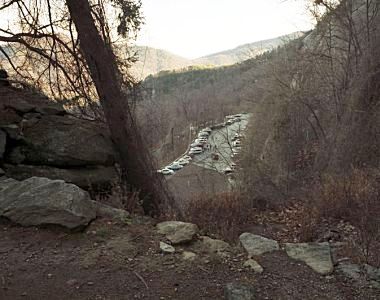 Big Rock Candy Mountain
Tammy Mercure
via The Exposure Project
_______________________
Beyond Economy, or the Infinite Debt to the Other:
Caputo and Derrida on Obligation and Responsibility
Chris Anderson-Irwin
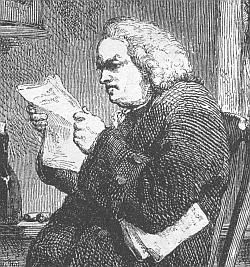
Dr. Johnson
reading 'The Vicar of Wakefield
Portraits of Humanists
Preface to A Dictionary of the English Language
Samuel Johnson
September 18, 1709 - December 13, 1784
When first I engaged in this work, I resolved to leave neither words nor things unexamined, and pleased myself with a prospect of the hours which I should revel away in feasts of literature, the obscure recesses of northern learning, which I should enter and ransack, the treasures with which I expected every search into those neglected mines to reward my labour, and the triumph with which I should display my acquisitions to mankind. When I had thus enquired into the original of words, I resolved to show likewise my attention to things; to pierce deep into every science, to enquire the nature of every substance of which I inserted the name, to limit every idea by a definition strictly logical, and exhibit every production of art or nature in an accurate description, that my book might be in place of all other dictionaries whether appellative or technical. But these were the dreams of a poet doomed at last to wake a lexicographer. I soon found that it is too late to look for instruments, when the work calls for execution, and that whatever abilities I had brought to my task, with those I must finally perform it. To deliberate whenever I doubted, to enquire whenever I was ignorant, would have protracted the undertaking without end, and, perhaps, without much improvement; for I did not find by my first experiments, that what I had not of my own was easily to be obtained: I saw that one enquiry only gave occasion to another, that book referred to book, that to search was not always to find, and to find was not always to be informed; and that thus to persue perfection, was, like the first inhabitants of Arcadia, to chace the sun, which, when they had reached the hill where he seemed to rest, was still beheld at the same distance from them.
I then contracted my design...(more)
_______________________

Francis Bruguière
(1879-1945)
_______________________
Transcription of the 2005 Kenyon Commencement Address
David Foster Wallace
May 21, 2005
via
It's a matter of my choosing to do the work of somehow altering or getting free of my natural, hard-wired default setting which is to be deeply and literally self-centered and to see and interpret everything through this lens of self. People who can adjust their natural default setting this way are often described as being "well-adjusted", which I suggest to you is not an accidental term.
Given the triumphant academic setting here, an obvious question is how much of this work of adjusting our default setting involves actual knowledge or intellect. This question gets very tricky. Probably the most dangerous thing about an academic education -- least in my own case -- is that it enables my tendency to over-intellectualize stuff, to get lost in abstract argument inside my head, instead of simply paying attention to what is going on right in front of me, paying attention to what is going on inside me.
As I'm sure you guys know by now, it is extremely difficult to stay alert and attentive, instead of getting hypnotized by the constant monologue inside your own head (may be happening right now). Twenty years after my own graduation, I have come gradually to understand that the liberal arts cliché about teaching you how to think is actually shorthand for a much deeper, more serious idea: learning how to think really means learning how to exercise some control over how and what you think. It means being conscious and aware enough to choose what you pay attention to and to choose how you construct meaning from experience. Because if you cannot exercise this kind of choice in adult life, you will be totally hosed. Think of the old cliché about quote the mind being an excellent servant but a terrible master....(more)
_______________________
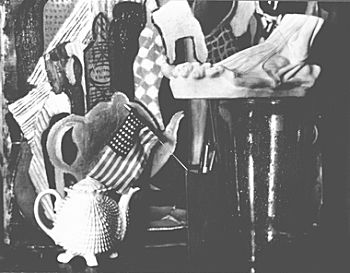
Still life with flag, painting & cast
Francis Bruguière
ca. 1935
_______________________
Playing With Big Numbers
Ajmer Rode
Translation by Ajmer Rode
Although things could be simpler on a
smaller scale. Suppose as a result
of the debt, five million children die
every year , as in fact they do,
and each dying child cries
a minimum of 100 times a day
there would be a trillion cries
floating around
in the atmosphere just over a
period of five years.
Remember a sound wave once
generated never ceases to exist
in one form or the other,
and never escapes the atmosphere.
Now one fine morning, even if
one of these cries suddenly hits
you, it will shatter your soul into
a billion pieces. It will take
14 years to gather
the pieces and put them back
into one piece.
On the other hand, maybe all the
trillion cries could hit your soul
and nothing would happen.....
...(more)
3quarksdaily
_______________________
The current subprime crisis has been doing wonders for the reception of any ideas about probability-driven claims in science, particularly in social science, economics, and "econometrics" (quantitative economics).
The Fourth Quadrant: A Map Of The Limits Of Statistics Nassim Nicholas Taleb Edge
We can identify where the danger zone is located, which I call "the fourth quadrant", and show it on a map with more or less clear boundaries. A map is a useful thing because you know where you are safe and where your knowledge is questionable. So I drew for the Edge readers a tableau showing the boundaries where statistics works well and where it is questionable or unreliable. Now once you identify where the danger zone is, where your knowledge is no longer valid, you can easily make some policy rules: how to conduct yourself in that fourth quadrant; what to avoid. ...(more)
_______________________
An isolating, maverick, insensate war does not go together with lower taxes and tsunamic mortgage fraud (or, "overtrust" as suggested by someone on the WSJ's "Deal Journal"). The people who re-sent in the clowns in 2004 still do not see this. When Bush & co. bribed middle-class favor by tacitly giving USians freedumb to do anything, say anything, promise anything to one another in the business arena so long as the admin had a blank check to keep shooting people in the Middle East, we as a polity forfeited any claim to "moral hazard."
-
Tom Matrullo
_______________________

It isnae Disney!
Dustin Shum
via Jörg Colberg
_______________________
from
Twelve Theses on the Economy of the Dead
10. In the world of the living there is an equivalent but contrary phenomenon.
The living sometimes experience timelessness, as revealed in sleep, ecstasy,
instants of extreme danger, orgasm, and perhaps in the experience of dying itself.
During these instants the living imagination covers the entire field of experience
and overruns the contours of the individual life or death. It touches the waiting imagination of the dead.
11. What is the relation of the dead to what has not yet happened, to the future?
All the future is the construction in which their “imagination” is engaged.
12. How do the living lie with the dead? Until the dehumanisation of society by capitalism,
all the living awaited the experience of the dead. It was their ultimate future. By themselves the living were incomplete.
Thus living and dead were inter-dependent. Always. Only a uniquely modern form of egotism has broken this inter-dependence.
With disastrous results for the living, who now think of the dead as eliminated. Poems: John Berger
LEFT CURVE no. 31via Jim Johnson
_______________________

Radio Times
Francis Bruguière
_______________________
Who knew that French theory-hating Republicans would be such adept poststructuralists? Floating signifiers are everywhere.
Just Because She Sings and Dances in Her Underwear...
Sarah Churchwell
Be careful what you wish for. Back in the late 1980s and early 1990s, when I was an earnest neophyte feminist at Vassar, earnestly debating the meanings of feminism, sexism, and choice, I used to wish, earnestly, that we would have a political campaign that actually discussed these issues. And this year I finally got one. Sort of. Only the disingenuousness of the conversation we're actually having is something that I, in my actual ingenuousness then, could never have envisioned. But democracy being what it is, and Republicans being what they are, it's turned into something very twisted, indeed.(....)
There is a reason why feminists put reproductive rights at the center of their political agenda: because "the rights of women" are not merely the right to vote, or to equal opportunity, or to equal pay, or to safety from violence and threat. (None of which seem to concern Sarah Palin or John McCain overmuch, either, needless to say.) It is also the right to control our own bodies the way that men are able to control their own bodies.
It is possible, although tricky, to define yourself as an anti-choice feminist, who believes in and advocates all other rights of women but does not advocate a woman's right to choose whether to bear children against her own will. This is a difficult logical position for any number of reasons-which were shown perhaps most clearly by the Daily Show's trip to the Republican National Convention, and their exposure of the absurd double standards, double talk, and disingenuousness (did I mention that they're disingenuous?) of the Republican stance over Bristol Palin's "private choice" to keep her baby and her mother's anti-choice political agenda....(more)
via Stuart Noble
_______________________
Sex appeal
America’s Religious Right has devised a seductive new recruitment strategy
Dagmar Herzog
New Humanist
Secularising its message allowed the Religious Right to repackage repression as the promotion of mental wellbeing. That which used to be deemed immoral is now presented as likely to induce depressive feelings of self-loathing. In dozens of variations, Americans are taught these days that any sex outside marriage - or even emotionally disconnected sex within marriage - is evidence of "low self-esteem" and something that will inescapably lead to "depressions".
The success of the Religious Right on this topic is remarkable. It's especially evident in the way that many self-defined sexual liberals now rush to concede that a delay in sexual debut is desirable, that abstinence is "a laudable goal", and that keeping the number of sexual partners in a lifetime to a minimum is an important sign of psychological health and self-valuing. Sexual experience is no longer seen as a resource, but rather a matter of risk and regret. Female sexual agency has once again been made dirty and suspect. Shaming is the new name of the game....(more)
_______________________
Sex Is McCain's Political Weapon
JoAnn Wypijewski
"Sarah Palin: babies, guns, Jesus, hot damn!" he crowed. "We're the ones that have the babe on the ticket!"
- Rush Limbaugh
_______________________
Steven Shaviro on Palin
The Pinocchio Theory
Palin is a paradessence, and hence a wildly popular commodity, because she combines the family-centeredness of the ideal suburban Mom with the ruthlessness of a corporate “warrior” in the dog-eat-dog neoliberal economy, or of a hard-core ideologue/foot soldier for the Far Right. She is sort of a perfect combination of June Cleaver and Ilse Koch. She both energizes the GOP’s fundamentalist-Christian base (which was previously very suspicious of McCain), and appeals to non-fundamentalist, independent white voters (who find her even more charismatic than Obama — with the added advantage that she’s white, to boot). It is probable that, given how gender formations work in America today, so powerful a paradessence would have to appear in the form of a woman, rather than a (heterosexual) man. But the most valid categories for comprehending Palin remain those of media theory and political economy, rather than those of the metaphysics of gender difference....(more)
_______________________
Quaeries Electoral and Political
For those America-Bound
Justin E. H. Smith
It is said that Americans vote for such rough and common candidates as McCain and his consort Ms. Palin not because they agree with the ratiocinations of these persons in matters political, but because their world has been "dis-enchanted" by the onslaught of "modernity," beloved of the atheistickal party of Democritus, and they are now looking for a means to re-enchant their world with "values," to see themselves (to quote another learned American doctor) as "part of a normative whole that includes man and nature in a unified and intricate web of meaning." What do McCain and Palin propose in this connection? What vital principles do they see as governing natural motion? Souls, perhaps? Entelechies? Psychopyric semina? Hylozoickal archaei?...(more)
_______________________
Rage on the Radio
BILL MOYERS JOURNAL takes a tough look at the hostile industry of "Shock Jock" media with a hard-hitting examination of its effects on our nation's political discourse.
_______________________

The Heart Rejoices At Release
Francis Bruguière
ca. 1930 _______________________
LEFT CURVE no. 32
History, The Sublime, Terror: Notes on the Politics of Fear [pdf]
Gene Ray
.....................................................
Pity The Nation
(After Khalil Gibran)
Pity the nation whose people are sheep
And whose shepherds mislead them
Pity the nation whose leaders are liars
Whose sages are silenced
And whose bigots rule the airwaves
Pity the nation that raises not its voice
Except to praise conquerers
And acclaim the bully as hero
And aims to rule the world
By force and by torture
Pity the nation that knows
No other language but its own
And no other culture but its own
Pity the nation whose breath is money
And sleeps the sleep of the too well fed
Pity the nation oh pity the people
who allow their rights to erode
and their freedoms to be washed away
My country, tears of thee
Sweet land of liberty!
--Lawrence Ferlinghetti
Left Curve"Redemption looks to the small fissure in the on-going catastrophe." - Benjamin
_______________________

Francis Bruguière .....................................................
The Evanescent City
George Sterling
With Nine Illustrations after Photographs by Francis Bruguiere
1916
 Middleville Fall Fair
photo - mw
_______________________
Blanchot, Narration, and the Event
Lars Iyer
pmc
No doubt the drive to unify, to relate everything back to a point of origin, is a liability inherent to all forms of narration. In this sense, it might be possible to invoke a grand narrative that unifies all other narratives, a broader, deeper story that always aims to perpetuate a reassuring order, regulating the relationship between members of a community and between that community and others. In The Postmodern Condition, Lyotard tells us that the age of the grand récit has passed, but perhaps the grandest tale of them all--the tale that is told in the elaboration of any tale--still exerts its dominion. In this way, the narrative turn risks granting dignity to a debilitating and demobilizing story of the dominance of hegemonies and elites. It becomes necessary, therefore, as part of this turn to rethink narration, treating it, as Linda Singer recommends of community, not as "a referential sign" but as "a call or appeal" . The turn in question calls for provocative responses, for attempts to resist the prevailing determination of meaning and value.
Maurice Blanchot, I will suggest, shows us how we might respond to an appeal inherent in the desire to narrate that would permit us to articulate a different relationship to the dominating narratives of our time. (....) The Blanchotian récit marks the memory of the experience that the novel leaves behind in order to become a novel. The struggle at the birth of the novel is therefore the struggle to do away with the event to which the récit bears witness, that is, to leave the "dead" or "disappeared" Ulysses in the water, to abandon death in favor of the deathless life of the whole, discontinuity in favor of absence, the absence of work for the work that gathers everything together. In leaving behind the récit, the novel also leaves the event itself behind. The novel is, for all its riches, only a narration of that which it has already lost. Yes, it dazzles; the novel reproduces the richness and detail of the world. The Blanchotian novelist dreams of Unity, where discontinuity would be merely a sign of the failure of the understanding, a mark of our finitude. In this way, the novel exerts, in advance, a grasp of the whole, of the time and space in which everything unfolds. The Blanchotian novel does not accomplish an absolute invention, creating something ungoverned by pre-existing rules. But in another sense, it is the Blanchotian récit that marks itself into the opening of the novel as the novel is marked as an inventive event. It is only the critical commentator who can attend to the happening of an event that itself reinvents the notion of invention and the inventor, for it no longer refers to the contrivance of an ingenious person. The novelty of this event is not that of a new art, instrument, or process. The invention that the récit "is" (beyond the intentions of the author of the novel) happens each time singularly and without precedent, cutting across what offers itself too readily to appropriation, identification, and subjectivation....(more)
_______________________
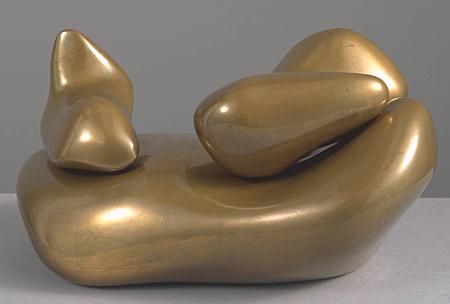
Sculpture to be Lost in the Forest
Jean Arp / Hans Arp
September 16, 1886 – June 7, 1966
_______________________
The Domestic Stones (fragment)
Jean Hans Arp
Translated from the French by David Gascoyne
...
a mouth opens within another mouth
and within this mouth another mouth
and within this mouth another mouth
and so on without end
it is a sad perspective
which adds an I-don't-know-what
to another I-don't-know-what
consequently the grasshopper is a column
the pianos with heads and tails
place pianos with heads and tails
on their heads and their tails
consequently the tongue is a chair
...(more)
_______________________

photo - mw
_______________________
An Investigation of the Stone and the Shadow
a poem by Giorgio Agamben
presented at notes for the coming community
The Lion dreams
and dreams the Rose.
The Rose dreams
and dreams the King.
The King dreams
and dreams the law.
The law dreams
and dreams grace.
Grace dreams
and dreams the circle.
The circle dreams
and dreams the line.
The line dreams
and dreams pain.
Pain dreams
and dreams the scale.
The scale dreams
and dreams the shadow.
The shadow dreams
and dreams Gold.
Gold dreams
and dreams the stone.
...(more)
_______________________
Krisis: A Journal of Contemporary Philosophy
2008, Issue 2
Posh anarchism
Gijs Van Oenen reviews Simon Critchley's InfinitelyDemanding: Ethics of Commitment, Politics of ResistanceThe state is a limitation on human existence
An interview with Simon Critchley
_______________________
Ignoring Obama’s solemn appeals for unity, America has become joyously divided. Evangelicals, braced by Palin’s Christian faith, have risen spryly from the bed of their indifference to McCain, a man whose relationship to the Holy Spirit is remote. Now their champion is an accredited bible-thumper, in whom the Holy Spirit burns as brightly as natural gas flares over the Arctic tundra.
- Alexander Cockburn
_______________________
Sarah Palin's Demon Haunted Churches
The Complete Edition
Bruce Wilson
Talk To Action
Reclaiming Citizenship, History, and Faith
_______________________
 _______________________
_______________________
Sarah Palin: Vice Wrapped in Virtue
M. Junaid Levesque-Alam
...it is prudent to ask a crucial question: why is Palin so fond of unborn life but so contemptuous of those who have exited the womb?
Palin’s loyalties lie with a party that stands against health care for poorer Americans, against relief for indebted homeowners, and against tax breaks for the working and middle-classes. Why do these lives not matter?
Also standing in striking contrast to the GOP’s professed respect for unborn life is its open contempt for dark-skinned life in various corners and crevices of the globe. In Iraq, Afghanistan, Lebanon and Palestine, Palin’s party has cheerfully dropped or supplied bombs that have erased thousands of children from the montage of mankind.
So while Democratic centrists stay silent, they pass up a peerless opportunity to ask why the “culture of life” honors those who aren’t yet alive while making sure those who are alive don’t stay alive....(more)
God, Oil and Guns
A Palin Theocracy?
Marjorie Cohn again I highly recommend...
Mudflats
Tiptoeing Through the Muck of Alaskan Politics
.....................................................
Left Behind
Religion, Technology, and Flight from the Flesh
Stephen Pfohl
Although marketed beneath the radar of most secular readers, the Left Behind series has already sold in the vicinity of an astounding 63 million copies. This represents an unprecedented and an enormously influential conservative Christian intervention into contemporary American (popular) culture. This essay explores the social genesis and impact of the Left Behind books, the social technologies they deploy, and their accompanying media offshoots. In so doing, I hope to shed modest light on key elements of the religious imagination mobilized for political purposes......(more)
_______________________
The Christian Right, Dominionism, and Theocracy
Chip Berlet
Sarah Palin: Dominionist Stalking Horse
Sarah Palin and Christian Dominionist Theocracy _______________________

Yes. The Alaska Women Reject Palin rally was significantly bigger than Palin’s rally that got all the national media coverage! So take heart, sit back, and enjoy the photo gallery. Feel free to spread the pictures around (links are appreciated) to anyone who needs to know that Sarah Palin most definitely does not speak for all Alaskans. The citizens of Alaska, who know her best, have things to say.
- mudflats
_______________________
Everyone in that room last night recognized that suddenly, speaking out about Sarah Palin has become an act of sobering and great importance.
- Mudflats
_______________________
Select Alaska Links
Blogs bringing up to the minute facts and perspectives from our 49th State…
compiled by Frank Paynter
_______________________
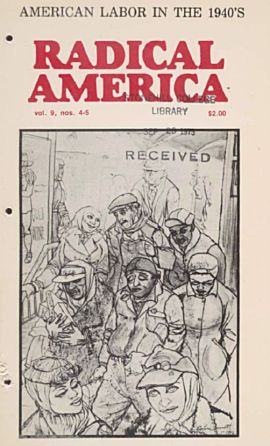
Radical America
Vol. 9 No. 4-5
Radical America, 1967-1999
From the introduction
There are real gaps is our knowledge of working-class history in the 1940's, and this special issue of Radical America is an attempt to fill them. We also hope to illuminate the immediate historical roots of contemporary, working-class development in the U.S.
_______________________
Why rednecks may rule the world
Joe Bageant
Deer Hunting with Jesus:
Dispatches from America's Class War
Joe Bageant
Joe's Blog
_______________________
This is Your Nation on White Privilege
Tim Wise
Z Space
For those who still can't grasp the concept of white privilege, or who are constantly looking for some easy-to-understand examples of it, perhaps this list will help.
# White privilege is when you can get pregnant at seventeen like Bristol Palin and everyone is quick to insist that your life and that of your family is a personal matter, and that no one has a right to judge you or your parents, because "every family has challenges," even as black and Latino families with similar "challenges" are regularly typified as irresponsible, pathological and arbiters of social decay.
# White privilege is when you can call yourself a "fuckin' redneck," like Bristol Palin's boyfriend does, and talk about how if anyone messes with you, you'll "kick their fuckin' ass," and talk about how you like to "shoot shit" for fun, and still be viewed as a responsible, all-American boy (and a great son-in-law to be) rather than a thug.
# White privilege is being able to say that you support the words "under God" in the pledge of allegiance because "if it was good enough for the founding fathers, it's good enough for me," and not be immediately disqualified from holding office--since, after all, the pledge was written in the late 1800s and the "under God" part wasn't added until the 1950s--while believing that reading accused criminals and terrorists their rights (because, ya know, the Constitution, which you used to teach at a prestigious law school requires it), is a dangerous and silly idea only supported by mushy liberals.
# White privilege is being able to be a gun enthusiast and not make people immediately scared of you. White privilege is being able to have a husband who was a member of an extremist political party that wants your state to secede from the Union, and whose motto was "Alaska first," and no one questions your patriotism or that of your family, while if you're black and your spouse merely fails to come to a 9/11 memorial so she can be home with her kids on the first day of school, people immediately think she's being disrespectful.
White privilege is being able to attend churches over the years whose pastors say that people who voted for John Kerry or merely criticize George W. Bush are going to hell, and that the U.S. is an explicitly Christian nation and the job of Christians is to bring Christian theological principles into government, and who bring in speakers who say the conflict in the Middle East is God's punishment on Jews for rejecting Jesus, and everyone can still think you're just a good church-going Christian, but if you're black and friends with a black pastor who has noted (as have Colin Powell and the U.S. Department of Defense) that terrorist attacks are often the result of U.S. foreign policy and who talks about the history of racism and its effect on black people, you're an extremist who probably hates America.
...(more)
_______________________

Before my Birth
Jean (Hans) Arp
1914
_______________________
The Air is a Root
Jean Hans Arp
The air is a root.
The stones are filled with tenderness. bravo.
bravo. the stones are filled with air.
the stones are watery branches.
on the stones replacing the mouth
grows the skeleton of a leaf. bravo.
A stone voice face to face and foot to foot
with a stone glance.
the stones are tormented like flesh
the stones are clouds for their second
nature dances to them on their third nose.
bravo. bravo.
when the stones scratch themselves, nails grow
on the roots. bravo. bravo.
the stones woke to eat the exact
hour
_______________________

Vingt-Cinq Poèmes
Tristan Tzara
Illustrated by Jean Arp
Collection Dada, 1918
_______________________
radiOM.org
...the website that brings you the sounds of revelationary new music and the voices of the revelationists themselves.
Our offerings include interviews with some of the most influential composers of our time including Lou Harrison, Brian Eno, John Cage, Laurie Anderson, György Ligeti, and Anthony Braxton.
We also offer concerts, sound poetry performances, lectures and documentaries in classical music, jazz, experimental music and other forms.
The material you will find here is gleaned from thousands of hours of audio recordings from KPFA-FM radio in Berkeley (1949-1995), and concerts and talks produced by Other Minds in San Francisco (1993-2005).
|







































































 Our genetic and computer codes may be Manichean, but our thinking must not be. Dualism, which originated as a theory about the structure of the world, has calcified into an analytical set piece. We must find another model. We must bring a multivalent tool to bear on political, sociological, philosophical or economic issues. It would be rigorously open-minded, continuously recalibrated. It would cast dichotomies as guideposts rather than fenced-in camps. It would be vibrantly relational, a cross-pollinating perspective yielding imaginative solutions rather than deadening, zero-sum compromises.(...)
Our genetic and computer codes may be Manichean, but our thinking must not be. Dualism, which originated as a theory about the structure of the world, has calcified into an analytical set piece. We must find another model. We must bring a multivalent tool to bear on political, sociological, philosophical or economic issues. It would be rigorously open-minded, continuously recalibrated. It would cast dichotomies as guideposts rather than fenced-in camps. It would be vibrantly relational, a cross-pollinating perspective yielding imaginative solutions rather than deadening, zero-sum compromises.(...) After a national catastrophe, Americans sometimes look to poetry for relief. Poetry is rediscovered and valued for the power of its rhetoric, as if the poet can function as a kind of speechwriter for the ages, lending an era the words it needs to understand itself. But in this view, the poem's value is not to instruct or guide but to comfort and assuage—to situate the present in all its disruption within a larger time frame, to make our current pain seem like a passing woe. Or as poet-critic Stephen Burt writes in a 2003 essay considering the post-9/11 popularity of W.H. Auden's "September 1, 1939": "We turn to poems most urgently, perhaps, just when we feel that our choice among courses of action (in public matters or elsewhere) is no choice at all, and that nothing we do in a world wholly outside ourselves can resolve the genuine conflict we face." This well-entrenched opinion that, when it comes to public matters, poetry can best function as consolatory, gently reminding us of our inability to solve immense dilemmas, is what Philip Metres sets out to oppose in his tightly focused case studies.
After a national catastrophe, Americans sometimes look to poetry for relief. Poetry is rediscovered and valued for the power of its rhetoric, as if the poet can function as a kind of speechwriter for the ages, lending an era the words it needs to understand itself. But in this view, the poem's value is not to instruct or guide but to comfort and assuage—to situate the present in all its disruption within a larger time frame, to make our current pain seem like a passing woe. Or as poet-critic Stephen Burt writes in a 2003 essay considering the post-9/11 popularity of W.H. Auden's "September 1, 1939": "We turn to poems most urgently, perhaps, just when we feel that our choice among courses of action (in public matters or elsewhere) is no choice at all, and that nothing we do in a world wholly outside ourselves can resolve the genuine conflict we face." This well-entrenched opinion that, when it comes to public matters, poetry can best function as consolatory, gently reminding us of our inability to solve immense dilemmas, is what Philip Metres sets out to oppose in his tightly focused case studies. from
from